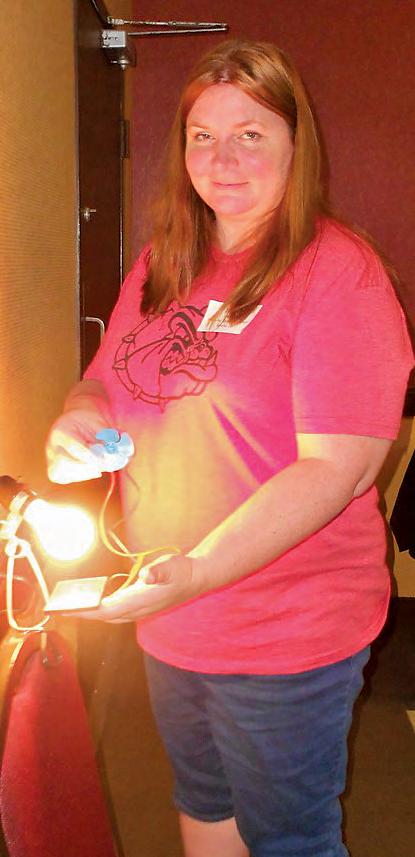



2023-2024 Resource Catalog & Planning Guide The National Energy Education Development Project THE NATIONAL ENERGY EDUCATION DEVELOPMENT PROJECT 8408 Kao Circle Manassas, VA 20110 Phone: 1-800-875-5029 Fax: 1-800-847-1820 Email: info@need.org www.NEED.org
TEACHER ADVISORY BOARD
Constance Beatty Kankakee, IL
La’Shree Branch
Highland, IN
James M. Brown Saratoga Springs, NY
Mark Case Randleman, NC
Lisa Cephas Philadelphia, PA
Nina Corley Galveston, TX
Samantha Danielli Oakton, VA
Shannon Donovan Greene, RI
NEED STAFF
Mary Spruill
Executive Director
La’Shree Branch Advisor, Student Engagement
Tyler Cvitkovic Program Associate, Building Operator Certified
Molly Duett
Creative Director
Robert Griegoliet Advisor, Student Engagement and Educational Technology
Sandra Harben
Accounting and Office Manager
Melanie Harper
Program Associate
Emily Hawbaker
Curriculum Director
Evelina Juarez
Project Manager, Exelon STEM Academy
Doug Keaton Advisor, Career and Technical Education
Michelle Garlick Long Grove, IL
Michelle Gay Daphne, AL
Nancy Gifford Harwich, MA
Erin Gockel
Farmington, NM
Robert Griegoliet Naperville, IL
DaNel Hogan Tucson, AZ
Greg Holman Paradise, CA
Barbara Lazar Albuquerque, NM
Robert Lazar
Albuquerque, NM
Leslie Lively
Porters Falls, WV
Melissa McDonald
Clarksburg, MD
Paula Miller
Philadelphia, PA
Hallie Mills
St. Peters, MO
Jennifer Mitchell-Winterbottom
Pottstown, PA
Monette Mottenon
Montgomery, AL
Mollie Mukhamedov
Port St. Lucie, FL
Cori Nelson Winfield, IL
Don Pruett Jr. Puyallup, WA
Judy Reeves Lake Charles, LA
Libby Robertson
Chicago, IL
Amy Schott
Raleigh, NC
Tom Spencer
Chesapeake, VA
Jennifer Trochez MacLean Los Angeles, CA
Wayne Yonkelowitz Fayetteville, WV
NEED DISTRIBUTION CENTER
David Keene General Counsel
Vernon Kimball Curriculum and Training Associate
Rebecca Lamb Program Director
Francine Martin Program Assistant
Wendi Moss Program and Training Coordinator
Sue Parrent
Curriculum and Training Associate
Amy Schott Program Associate
Barry Scott State Program Director, California
Kimberly Swan Outreach and Evaluation Coordinator
Caryn Turrel Curriculum and Training Associate, CEM
Cindy Welchko Curriculum Associate
Pat Bowles
Cindy Foster
Rick Hall
Karen Harris
Melissa Spencer
Bonny Spruill
2 2023-2024 Resource Catalog and Planning Guide www.NEED.org
Everything in the kit and lessons are very thorough and that really helps us in the classroom.”
—1st grade teacher
“
TABLE OF CONTENTS

2023-2024 Resource Catalog and Planning Guide 3 www.NEED.org
Teacher Advisory Board 2 This is NEED 4 NEED Curriculum 5 NEED Curriculum Packet 6 NEED’S Eight Step Energy Unit 7 NEED Basic Curriculum Units 8 NEED Curriculum Matrix 9 Additional Resources 11 Science of Energy 13 Sources of Energy 15 Electricity and Magnetism 24 Transportation 25 Efficiency, Conservation, and Climate 26 Synthesis and Reinforcement 30 Evaluation 32 Student Leadership and Outreach 33 Career and Workforce Development 34 NEED Merchandise 37 Order Form 38 NEED National Sponsors and Partners 39
THIS IS NEED
PUTTING ENERGY INTO EDUCATION
The NEED Project provides innovative K-12 educational materials, inperson and virtual teacher and student training programs, evaluation, and recognition. NEED materials and training conferences are designed to provide comprehensive, objective information about energy production and consumption and the major energy sources—how they are used and their impact on the environment, economy, and society. The program emphasizes the development of critical thinking and problem solving skills using inquiry activities that encourage students to consider the trade-offs inherent in energy decisions.
NEED materials have been designed to meet the needs of teachers and students, support the Next Generation Science Standards, and are correlated to all state science standards and the Common Core State Standards. For more information on curriculum correlations, visit www.NEED.org/educators/curriculum-correlations/.
Activities are available at all grade levels and are even used in technical schools, community colleges, and universities. Modules and materials embody NEED’s Kids Teaching Kids pedagogy by encouraging students to teach others. The NEED Project relies on a Teacher Advisory Board to ensure that all curriculum materials work in the classrooms, are objective, up-todate, scientifically accurate, and meet the requirements of national and state standards.
NEED works with school districts and teachers across the country to design and implement individualized energy programs to meet their education goals and objectives. In many areas, NEED materials are incorporated into the formal curriculum at many grade levels. NEED tailors programs to meet the specific requirements of individual states, school districts, and teachers. NEED is fortunate to be the education partner for many local, state, and national energy outreach programs.
NEED MISSION STATEMENT
The National Energy Education Development (NEED) Project is a 501(c)(3) nonprofit education association incorporated in the Commonwealth of Virginia. The mission of NEED is to promote an energy conscious and educated society by creating effective networks of students, educators, business, government, and community leaders to design and deliver objective, multi-sided energy education programs. Established by Presidential Proclamation in 1980, NEED is a dynamic, engaging program present in thousands of schools nationwide.
PROFESSIONAL DEVELOPMENT
The National Energy Education Development Project conducts workshops and professional development programs throughout the year to meet the needs of school districts and individual teachers. Workshops and PD can be conducted both in-person or virtually. These training programs provide comprehensive energy information and introduce educators to NEED materials and other energy education resources. Information about upcoming conferences, workshops, and other events is available on NEED’s website, www.NEED.org. To discuss hosting a training program, call NEED Headquarters at 1-800-875-5029.
NATIONAL ENERGY CONFERENCE FOR EDUCATORS
Every summer, NEED conducts a five–day conference for educators. Educators delve deeply into how to teach energy and how to implement NEED programs in the classroom. Graduate credit is available for teachers in the program. Registration fee includes lodging (double occupancy), most meals, and materials. For more information, contact NEED at 1-800-875-5029 or visit http://nationalenergyconference.org/
STUDENT LEADERSHIP AND OUTREACH
As students learn about energy during the year, they put their knowledge to good use. Our students are leaders. Since The NEED Project began in 1980, students have been learning and leading others to an understanding of energy in the world. They are teaching the next generation to make wise energy decisions. The Kids Teaching Kids approach works.
Each year, NEED’s Annual Youth Energy Conference and Awards will give students more opportunities to learn about energy and to explore energy in STEM (science, technology, engineering, and math). The annual June conference will have students from across the country working in groups on an Energy Challenge designed to stretch their minds and energy knowledge. The conference will culminate with the Youth Awards Ceremony recognizing student work throughout the year and during the conference. Visit https://youthawards.need.org/ for more information.
4 2023-2024 Resource Catalog and Planning Guide www.NEED.org
NEED CURRICULUM & CURRICULUM PACKET
NEED curriculum is developed by our curriculum team and tested and refined by a national Teacher Advisory Board (TAB) that is dedicated to developing and promoting standards-based energy curriculum and training. The curriculum employs a number of strategies for teaching students about energy. Most NEED modules are inquiry-based, using a Kids Teaching Kids approach. Activities that are not inquiry-based are highly engaging and interactive, helping students to develop and access critical thinking skills. NEED strongly believes in integrating energy education across all subject areas including science, technology, engineering, mathematics, language arts, social studies, and creative arts.
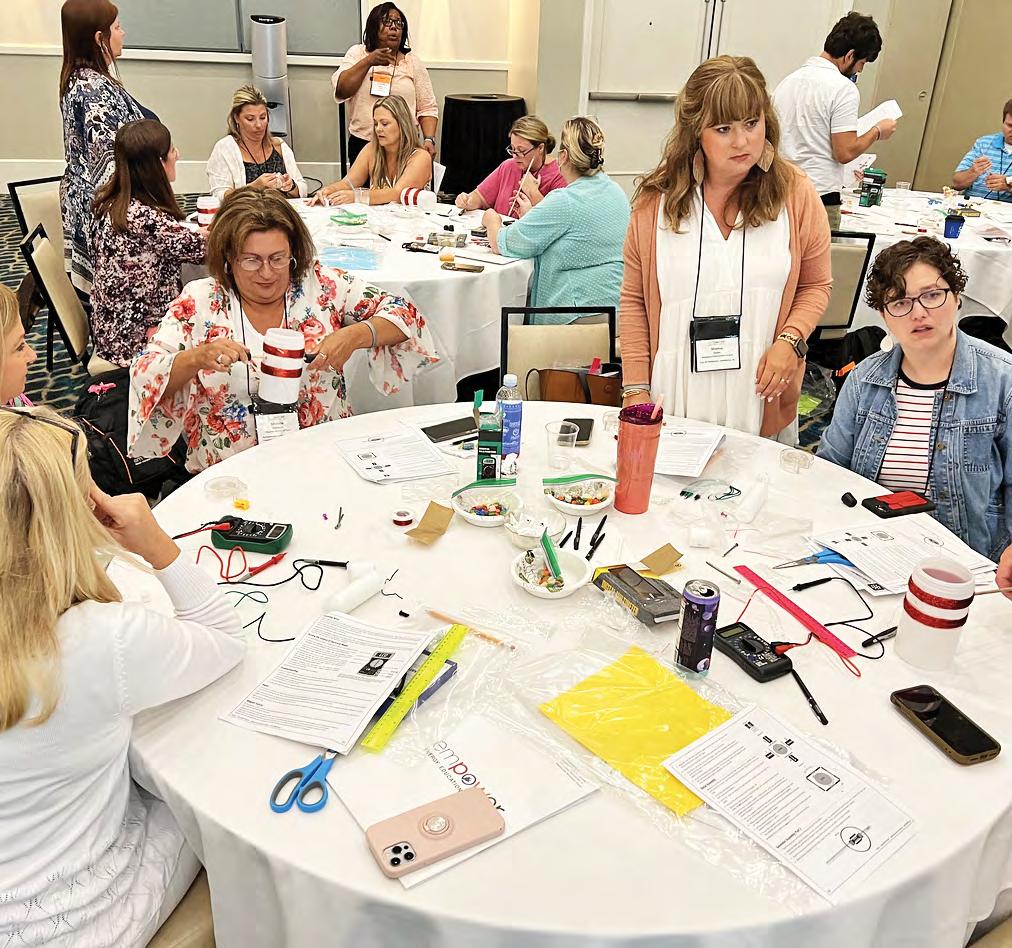
NEED also believes in providing current energy data to our teachers and students. The majority of statistics and data published are derived from the most recent, complete annual data made available by the U.S. Energy Information Administration (EIA) at the time of publishing. Working in partnership with the EIA, NEED includes easy to understand data in our curriculum materials.

In order for students to receive a comprehensive energy education, NEED has developed an eight-step model to help teachers plan a complete energy unit. Each step of the model is outlined on page 7. NEED has designed Basic Curriculum Units for each grade level that follow this comprehensive model for energy education. For more information on these basic units, see page 8. Educators may easily build their own units that follow this eight-step model. NEED’s entire curriculum portfolio is available online. If large quantities of a title are needed, please contact NEED for more information on printed titles and requests for printing.
On pages 9-10 is a matrix of all available NEED materials categorized by NEED’s eight-step energy education model and by grade level. Educators may use this list and the curriculum descriptions found within this guide to customize their own energy unit. Pages 11-12 include a list of additional resources that can enhance instruction.

2023-2024 Resource Catalog and Planning Guide 5
The activities stimulate discussions that result in students being more interested in events involving energy.”
– 9 - 12th grade teacher
“
“
I absolutely love the curriculum materials and will be able to use them immediately in my classroom. There are activities that I never would have thought of on my own. Thanks!
– 6-8th grade teacher
NEED CURRICULUM PACKET
Any educator can become a part of NEED’s dynamic network of schools across the nation participating in innovative energy education programs. NEED educators receive a NEED Curriculum Packet; e-newsletters; invitations to NEED conferences, workshops, and the Youth Energy Conference and Awards Program; and the opportunity to personalize classroom programs by accessing materials on the NEED website. Teachers can download all curriculum guides and supplemental materials in NEED’s library for free from NEED’s online store and website. NEED Curriculum Packets are provided by sponsors to all educators who attend NEED workshops. Curriculum packets are updated periodically and include a sampling of NEED’s favorite materials in addition to a few featured items. The curriculum packet will always include NEED’S Energy Infobooks and Energy Games and Icebreakers, in addition to a few NEED classics, new or refreshed content, or engaging and topical activities we know your students will enjoy. See below for full descriptions of our standard packet contents, and head to https://shop.need.org/ collections/curriculum-packet for a complete listing of the packet contents as well as links to download additional copies of the included titles.
ENERGY INFOBOOKS
NEED’s Energy Infobooks are provided in primary, elementary, intermediate, and secondary reading levels. The guides provide background and basic information on the sources of energy, electricity, transportation, conservation and efficiency, and consumption. The Infobooks can be used in the classroom as nonfiction text support for many NEED activities. Class sets of the elementary, intermediate, and secondary versions are available. The primary version of the guide is designed for teachers to read aloud to students. The Infobooks are revised every year to provide complete, up-to-date information. Infobooks are also available on NEED’s website as individual factsheets, and as e-publications. Download our new and improved Energy Infobook Activities to support these great text-based resources. Head to www.NEED.org/need-students/energy-infobooks/ for digital versions.
ENERGY GAMES AND ICEBREAKERS


This guide contains entertaining games and activities that serve as excellent introductions to an energy unit, or fantastic formative assessment tools to use throughout a unit or as review activities. Games include Electric Connections, Energy Chants, Energy Roundup, Energy Bingo, Energy Web Game, Candy Collector, and more.

6 2023-2024 Resource Catalog and Planning Guide
NEED’S EIGHT STEP ENERGY UNIT

STEP ONE: SCIENCE OF ENERGY
Students need to learn the science of energy before they can learn about the sources of energy, electric power generation, and energy efficiency and conservation. Students learn the forms of energy and how energy is transformed from one form into other forms. Secondary students can extend their knowledge to thermodynamics. Several hands-on kits are available for sale or rental, such as primary, elementary, intermediate, and secondary Science of Energy, and EnergyWorks.
STEP TWO: SOURCES OF ENERGY
These materials help students to become familiar with the energy sources used today—their formation, exploration, production, distribution, consumption, and economic and environmental trade-offs. Several units and kits are available that explore specific energy sources. NEED Energy Infobooks also provide comprehensive information on the major energy sources at four reading levels.
STEP THREE: ELECTRICITY AND MAGNETISM
These materials provide students with information and hands-on explorations of the scientific concepts of electricity and magnetism, electricity generation, transmission, and efficient use of electricity. Wonders of Magnets explores the basics of magnetism, while Energy Infobooks provide background information on electricity. NEED’s ElectroWorks curriculum is available, as well as solar, wind, nuclear, coal, and hydropower units and kits that include hands-on activities on electromagnetism. Current Energy Affair provides students with language arts activities about electricity.
STEP FOUR: TRANSPORTATION
Several modules are available that teach students about the transportation sector of the economy, current transportation fuels, and fuels and technologies of the future. Transportation Exploration and Energy on the Move help introduce students to transportation sources and technologies in a fun, handson way. Try Transportation Fuels Enigma and/or Transportation Fuels Debate for two additional, exciting options for introducing transportation and to get your energy unit moving!
STEP FIVE: EFFICIENCY AND CONSERVATION
Students learn how energy is consumed in our lives, about efficient technologies, and ways to conserve energy at home and at school. Check out our new and improved energy efficiency and conservation curriculum materials and kits, available for all grade levels.
STEP SIX: SYNTHESIS AND REINFORCEMENT
Many critical thinking and hands-on activities are available to help support the information the students have learned. Activities for students to teach others what they have learned are also available.
STEP SEVEN: EVALUATION
Most NEED activities include evaluation strategies within them, including pre- and post-assessments, rubrics, and project-based tasks. NEED’s Evaluation website contains several examples of these tools for use in the classroom. One such tool, NEED’s Question Bank, gives teachers the ability to customize evaluation tools to fit the needs of their energy unit. Also found on the website are NEED’S Energy Polls, multiple choice energy knowledge polls, at four grade levels. Visit www.NEED.org/educators/evaluations-assessment/ to download the polls, search for assessment questions, view sample rubrics, and for links to standards correlation information to fuel your planning.
STEP EIGHT: STUDENT LEADERSHIP AND OUTREACH
NEED’s Youth Energy Conference and Awards Program rewards students and classrooms for documenting their energy outreach efforts and student leadership. See page 33 or visit https://youthawards.need.org/ for more information about the Youth Awards Program and Conference. The deadline for project submissions is always April 15 each year.
2023-2024 Resource Catalog and Planning Guide 7 www.NEED.org
OFF
NEED BASIC CURRICULUM UNITS
NEED and its Teacher Advisory Board have designed NEED’s Basic Curriculum Units at four levels to help new teachers plan for and implement energy units in their classrooms. These units are designed to meet national and state standards for each level by teaching the science of energy, sources of energy, electricity and magnetism, transportation, and efficiency and conservation. Synthesis, reinforcement, evaluation, student leadership, and outreach activities are also included.
A teacher may choose to use the NEED Basic Curriculum Unit as shown below by level. Download each basic unit by visiting www.NEED.org/educators/basic-curriculum-units/. Teachers may also customize the unit by choosing and downloading guides or units that meet the needs of their students, or localized standards and programming. Descriptions of all NEED curriculum guides are contained in this catalog. All titles in NEED’s library can be downloaded from NEED’s website and online store for free in PDF format. Kit-based guides and infobooks are also available in print. See pages 13-29 for pricing information of printed items, where available.
To access each basic unit and download its components, please visit www.NEED.org/educators/basic-curriculum-units/. If large quantities or class sets of a title are needed, please contact NEED for more information on printed titles and print requests.
Energy Polls
INTRODUCTORY ACTIVITIES
STEP ONE:
SCIENCE OF ENERGY
STEP TWO:
SOURCES OF ENERGY
STEP THREE:
ELECTRICITY AND MAGNETISM
STEP FOUR:
TRANSPORTATION
STEP FIVE: EFFICIENCY AND CONSERVATION
STEP SIX:
SYNTHESIS AND REINFORCEMENT
STEP SEVEN: EVALUATION
STEP EIGHT:
STUDENT LEADERSHIP AND OUTREACH
Primary Science of Energy*
Energy Games and Icebreakers
Energy Infobooks*
Elementary Science of Energy* EnergyWorks*
Intermediate Science of Energy*
Secondary Science of Energy*
Energy Games and Icebreakers, Energy Infobooks*, and Energy Infobook Activites
Energy Stories and More Energy in the Balance
Wonders of Magnets
Transportation Exploration
Great Energy Debate
Energy Enigma
Energy Games and Icebreakers, Energy Infobooks*, and Energy Infobook Activites
ElectroWorks
Transportation Exploration
ElectroWorks
Mission Possible
Energy on the Move Energy on the Move
Energy Games and Icebreakers and Energy Infobooks*
Using and Saving Energy School Energy Inspectors*
School Energy Experts*
Energy Conservation Contract Understanding Climate Science*
Energy Games and Icebreakers
Primary Energy Carnival Energy Carnival Energy Carnival
Question Bank
Energy Polls
Youth Awards Program Guide
Note: The guides with asterisks (*) are also available in print.
NEED CURRICULUM MATRIX
School Energy Managers* Exploring Climate Science*
Energy Jeopardy Global Trading Game
The NEED Curriculum Matrix on the following pages is designed to assist teachers in planning an individualized energy unit. All NEED curriculum guides are listed by grade level, and by where the majority of information in the material fits into NEED’s recommended eight-step model. Individual descriptions of the curriculum begin on page 13. It is important to note that many curriculum pieces overlap steps. NEED Energy Infobooks are the foundational pieces of any energy education unit. Written at four levels—primary, elementary, intermediate, and secondary—these student readers have in-depth information on the major energy sources, electricity, transportation, and conservation. Subject specific guides such as the wind and nuclear modules have more extensive separate student backgrounders on the subject. Information in these guides include how the source is formed, how we harness energy from the source, and how we use the energy source to meet our needs. Information on historical uses of the source, electricity generation, developing technologies, and related careers are often included as well. Whether using a NEED Basic Curriculum Unit or selecting individual curriculum pieces, teachers should thoroughly review all materials and plan their units according to the needs of their students and their classroom timing and sequencing.
8 2023-2024 Resource Catalog and Planning Guide www.NEED.org
NEED BASIC CURRICULUM UNITS BASIC PRIMARY UNIT (K-2) BASIC ELEMENTARY UNIT (3-5) BASIC INTERMEDIATE UNIT (6-8) BASIC SECONDARY UNIT (9-12)
SECONDARY (9-12)
Blueprint for Student Energy Teams
INTERMEDIATE (6-8)
Carbon, Capture, Utilization, and Storage Chemistry and Energy Efficiency Energy Conservation Contract Energy Expos Energy Games and Icebreakers Energy House Exploring Climate Science * Managing Home Energy Use*
Blueprint for Student Energy Teams Building Science* Energy Conservation Contract Energy Expos Energy Games and Icebreakers Energy House Intermediate Energy Infobook * Managing Home Energy Use*
ELEMENTARY (3-5)
Blueprint for Student Energy Teams Elementary Energy Infobook* Energy Conservation Contract Energy Expos Energy Games and Icebreakers Energy House Managing Home Energy Use*
Museum of Solid Waste and Energy Plug Loads
School Energy Managers* School Energy Survey Secondary Energy Infobook*
Museum of Solid Waste and Energy Plug Loads School Energy Experts* Today in Energy Understanding Climate Science*
Digital Energy Energy Analysis Energy Around the World Energy Games and Icebreakers Energy Jeopardy Energy Live! Energy Math Challenge Energy on Stage Global Trading Game NEED Songbook Mission Possible Yesterday in Energy
Digital Energy Energy Analysis Energy Around the World Energy Carnival Energy Games and Icebreakers Energy Jeopardy Energy Live! Energy Math Challenge Energy on Stage Global Trading Game Greek Mythology and The Forms of Energy
PRIMARY (K-2)
All About Trash Blueprint for Student Energy Teams Energy Games and Icebreakers
STEP FIVE: EFFICIENCY AND CONSERVATION
Primary Energy Infobook* Today in Energy Using and Saving Energy
School Energy Inspectors* Talking Trash Today in Energy
Digital Energy Energy Around the World Energy Carnival Energy Fair Energy Games and Icebreakers Energy in the Balance Energy Jeopardy Energy Live! Energy Math Challenge Energy on Stage Global Trading Game
Energy Fair Energy Games and Icebreakers NEED Songbook
STEP SIX: SYNTHESIS AND REINFORCEMENT
Mystery World Tour NEED Songbook Yesterday in Energy
Greek Mythology and The Forms of Energy
Mystery World Tour NEED Songbook
Energy Polls Question Bank
Youth Awards Program Guide
Coal, Hydropower, Oil & Natural Gas, Nuclear, and Wind Curriculum Introduction to Solar Photovoltaics
School Energy Curriculum
Solar Careers Pathways
Your Future in Hydropower
Your Future in Marine Hydrokinetics
Your Future in Wind Energy
Primary Energy Carnival Yesterday in Energy
Energy Polls Question Bank
Youth Awards Program Guide
Coal, Hydropower, Oil & Natural Gas, Nuclear, and Wind Curriculum
Building Science School Energy Curriculum
Energy Polls Question Bank
Primary Energy Carnival
Energy Polls Question Bank
STEP SEVEN: EVALUATION
Youth Awards Program Guide
Coal, Hydropower, Oil & Natural Gas, Nuclear, and Wind Curriculum
School Energy Curriculum
Youth Awards Program Guide
STEP EIGHT: LEADERSHIP AND OUTREACH
Coal, Hydropower, Oil & Natural Gas, Nuclear, and Wind Curriculum
CAREER & WORKFORCE DEVELOPMENT RESOURCES
Note: All curriculum is available to download in PDF format from shop.NEED.org .
* Guides with asterisks (*) are also available in print. Please contact NEED for more information on printed titles and print requests.
10 2023-2024 Resource Catalog and Planning Guide www.NEED.org
ADDITIONAL RESOURCES
NEED CURRICULUM
Go to shop.NEED.org to view the guides by grade level or topic. All NEED guides are available as a free PDF download.

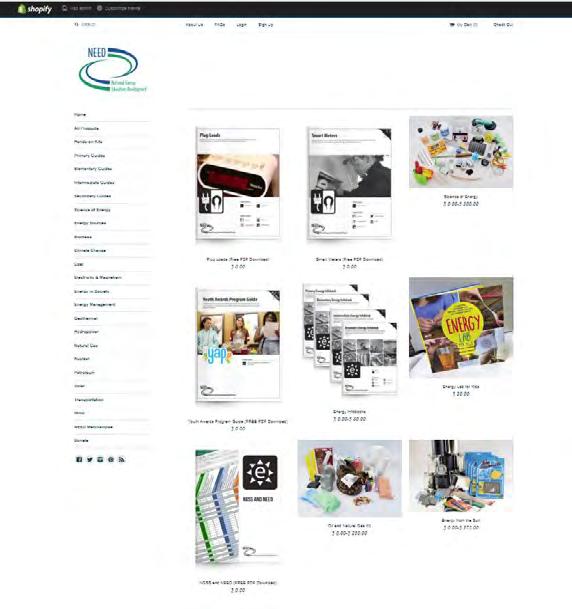
AWESOME EXTRAS!
Looking for more resources? Our Awesome Extras page contains PowerPoints, energy graphics, Energy At-A-Glance Fact Sheets, coloring pages, and other great resources to compliment what you are teaching in your classroom! This page is available under the Educators tab at www.NEED.org/educators/awesome-extras/
NEED NEWS
We feature new curriculum, teacher news, upcoming programs, and exciting resources regularly. To read the latest from the NEED network, visit www.NEED.org and scroll to “News”.

ONLINE REGISTRATION FOR WORKSHOPS
NEED offers professional development opportunities that energize teachers and remind them of the fun that is possible in the classroom when teaching about energy. These workshops are offered all over the country. View all of our upcoming events and register online at www.NEED.org/events/.
EVALUATIONS AND ASSESSMENT
Building an assessment? Searching for standards? Check out our Evaluations page for a question bank, NEED’s Energy Polls, sample rubrics, links to standards alignment, and more at www.NEED.org/educators/evaluations-assessment/.
NEED ENERGY BOOKLIST
Looking for cross-curricular connections, or extra background reading for your students? NEED’s booklist provides an extensive list of fiction and nonfiction titles for all grade levels to support energy units in the science, social studies, or language arts setting. Check it out at www.NEED.org/booklist/.
VIRTUAL AND DIGITAL LEARNING RESOURCES
Many classrooms have made a shift to teaching virtually. NEED has curated a collection of resources to assist teachers as they teach energy in-person, in hybrid settings, in virtual settings, or across distances both asynchronously or synchronously. The Distance Learning page includes links to samples of educational technology; games, puzzles, and energy fair activities; easy hands-on favorites; YouTube videos; and more. Be sure to check out our Teacher-Share-a-Thon page for examples of activities and videos other teachers used successfully. Shoot us an email at info@need.org to share something from your classroom! www.NEED.org/distancelearning.
ORDER MATERIALS ONLINE!
SHOP.NEED.ORG
Anemometers and solar cells and light meters-- oh my! Getting your kits (or refills) has never been easier! Check out NEED’s official online store at shop.NEED.org.
All titles in NEED’s library can be downloaded from NEED’s online store. PDFs of the guides are available for FREE download. It’s easy as 1 - 2 - 3 - 4.
1. Select “Free PDF Download”.
2. Add to your cart.
3. Check out.
4. Check your email for the guide link.
VINTAGE NEED
NEED has been sharing our energy since 1980! And just like fashions and seasons change, curriculum titles come and go as NEED gets older. If you download a book and see this cover, it means this particular title is an oldie, but a goodie. This guide is no longer on NEED’s annual update list, but we don’t want to say goodbye just yet! And, while data may not be current, the activities inside are still loads of fun. So, download and enjoy because it’s okay to kick it old school!
2023-2024 Resource Catalog and Planning Guide 11 www.NEED.org
NEED’S SMUGMUG GALLERY
http://need-media.smugmug.com/
On NEED’s SmugMug page, you’ll find pictures of NEED students learning and teaching about energy. Would you like to submit images or videos to NEED’s gallery? E-mail info@NEED.org for more information.
Online Graphics Library
Would you like to use NEED’s graphics in your own classroom presentations, or allow students to use them in their presentations? Download graphics for easy use in your classroom.
NEED’s YouTube Channel

Need a refresher on how to use Science of Energy with your students?
Check out our workshop videos. Also check out our Energy Chants videos! Find some great videos produced by NEED staff, teachers, and students teaching their peers and community members about energy and energy saving tools. www.youtube.com/user/NEEDproject
CAREER & TECHNOLOGY EDUCATION RESOURCES
The energy industry employs millions of Americans. Energy industry careers provide many options for students, regardless of the path they take beyond the K-12 environment. NEED has been compiling activities and entire units that can help educate your classes on the types of jobs available. Some of our units are geared for the CTE classroom, and will even help prepare them for industry specific careers in solar, hydropower, or the electricity generation industries. Check out our Career and Workforce curriculum on pages 34-35, or head to shop.NEED.org to download. Visit www.need.org/partners/needcareer-and-workforce-development-programs/ for more information
SOCIAL MEDIA
Stay up-to-date with NEED. “Like” us on Facebook! Search for The NEED Project, and check out all we’ve got going on!

Follow us on Twitter. We share the latest energy news from around the country, @NEED_Project.

Follow us on Instagram and check out the photos taken at NEED events, instagram.com/theneedproject
Follow us on Pinterest and pin ideas to use in your classroom, Pinterest.com/NeedProject
Subscribe to our YouTube channel for access to video lessons, career profiles, and more! www.youtube.com/user/NEEDproject
Follow us on LinkedIn for information, links to events, and more! linkedin.com/company/needproject

E-PUBLICATIONS
The NEED Project offers e-publication versions of various guides for classroom use. Guides that are currently available as an e-publication can be found at www.issuu.com/theneedproject.

www.NEED.org
ENERGY FLOWS
Grades 5-12
This hands-on activity explains the forms of energy and energy transformations to students. It can be used as a stand-alone activity or a companion activity to the Science of Energy Kit.


ENERGY INFOBOOKS
Grades K-12
Energy Infobooks are the resource for many NEED activities and include an introduction to energy, information on major sources of energy, new technologies, energy conservation, electricity, climate change, and other energy information. They are available on four reading levels and are revised and updated annually.
ENERGYWORKS AND KIT
Grades 4-8
The EnergyWorks suite includes background information and hands-on experiments that explore motion, light, sound, heat, growth, and powering technology. Teacher demonstrations are also included.
The kit includes a Teacher Guide, one Student Guide, and most of the equipment necessary to conduct the experiments. Replacement parts can be purchased separately so that the kit can be used for many years. Prices and information about replacement items can be obtained by calling 1-800-875-5029.



2023-2024 Resource Catalog and Planning Guide 13 www.NEED.org
STEP ONE
Primary Energy Infobook $5.50 Elementary Energy Infobook $5.00 Class Set of 30 Elementary Energy Infobooks $50.00 Intermediate Energy Infobook .................................. $5.00 Class Set of 30 Intermediate Energy Infobooks $60.00 Secondary Energy Infobook $5.00 Class Set of 30 Secondary Energy Infobooks $85.00
Teacher and Student Guides $7.00 EnergyWorks Kit $400.00 SCIENCE OF ENERGY
PRIMARY SCIENCE OF ENERGY AND KIT
Grades K-3
This unit includes background information and hands-on experiments to explore the fundamental concepts of energy while practicing their science process skills. Students explore the science of motion, heat, sound, and light with a series of simple activities that incorporate both English and metric measurements, using safe student thermometers, balances, rulers, measuring tapes, beakers, and graduated cylinders. Students learn to make observations, measure, record results, compare and contrast, categorize, make predictions, analyze and graph results, and draw conclusions.
The Primary Science of Energy Kit includes a comprehensive, step-by-step Teacher Guide with background information on the energy topics covered, instructional masters, and detailed instructions for each activity. The kit also includes one Student Guide and the materials needed for the students to conduct the experiments. Replacement parts can be purchased separately so that the kit can be used for many years. Prices and information about replacement items can be obtained by calling 1-800-875-5029.
SCIENCE OF ENERGY AND KIT
Elementary Guide (Grades 3-5)
Intermediate Guide (Grades 6-8)
Secondary Guide (Grades 9-12)
This unit provides background information and hands-on experiments to explore the different forms of energy and how energy is transformed from one form to another. Groups of students master six stations, then teach others about the energy transformations at their stations. Teacher demonstrations are included to introduce the unit. Reinforcement activities are also included. The stations include equipment to teach transformations, focusing on kinetic and potential energy, heat, light, motors, batteries, and electromagnetism.
The kit includes all three leveled guides (elementary, intermediate, and secondary), which include detailed teacher instructions, student instructions for the six stations, laboratory safety procedures, and the equipment necessary to conduct the experiments. The Science of Energy Kit works with all three levels of curriculum.

A Class Set of Consumables is available for purchase and contain 8 glow sticks, 8 handwarmers, 1 jar of calcium chloride, 10 balloons, 1 toy car, 10 rubber bands, 1 set of nails and wires, 1 solar cell, 1 live wire, and 1 candle.


THERMODYNAMICS
Grades 9-12
This unit includes hands-on experiments that explore concepts of thermodynamics. The Teacher Guide contains detailed teacher instructions, a list of materials, answer keys for laboratory experiments, and a sample unit exam, while the Student Guide includes background information and student worksheets. Thermal energy topics covered include: molecular structure, conduction, convection, radiation, specific heat, heat of fusion, and heat of vaporization.
14 2023-2024 Resource Catalog and Planning Guide www.NEED.org
Teacher and Student Guides ........................... $6.00 Primary Science of Energy Kit $275.00
Elementary, Intermediate, or Secondary Guides $7.50 Science of Energy Kit $300.00 Class Set of Consumables ............................. $50.00
STEP TWO SOURCES OF ENERGY
COAL
Grades K-12
Through hands-on, multi-disciplinary activities and background reading, students learn about coal formation and chemical properties, coal mining, the uses of coal, its role in electricity generation, environmental impacts, and careers related to coal mining and electricity generation.
All About Coal (K-5)
Understanding Coal (6-8)
Exploring Coal (9-12)
DIGITAL ENERGY
Grades 5-12
In Digital Energy students are tasked with researching an energy topic and creating a digital media presentation that teaches others about their topic. Throughout the project, students will analyze the importance of graphic elements in learning and presenting, and must synthesize the information they read to create their own graphics. Digital Energy projects also encourage students to prepare a script, write an assessment for their audience, and facilitate discussion after presenting. This activity is great for differentiated environments and multi-disciplinary classrooms, and can be a great building block after completing Energy Expos in your classroom.
ENERGY ENIGMA
Grades 7-12
Students put on their detective hats and research clues to uncover energy facts in Energy Enigma. Teams use language arts strategies, critical thinking, and organizational skills to conceal the identity of their energy source while trying to guess which energy sources the other teams represent. Teacher instructions and instructional masters are included. A browser-enabled version is available at shop.NEED.org
ENERGY EXPOS
Grades 4-12
Students work in groups to develop hands-on exhibits and make presentations to teach others about energy. Expos focus on energy sources, electricity, transportation fuels, and energy conservation. Teacher and student instructions are included in this guide.
ENERGY GAMES AND ICEBREAKERS
Grades K-12
This guide contains entertaining activities to introduce energy, efficiency, and conservation to students, as well as reinforce the information that has already been presented. Activities make wonderful formative assessment tools for use during any energy unit, and can easily be adapted to fit any content.
ENERGY IN THE BALANCE
Grades 3-5
This activity introduces elementary students to the advantages and disadvantages of the major energy sources through a series of critical thinking, charting, and graphing activities.
ENERGY INFOBOOKS
Grades K-12
Energy Infobooks are a great supporting resource for many NEED activities and include an introduction to energy, information on major sources of energy, new technologies, energy conservation, electricity, climate change, and other energy information. They are available on four reading levels and are revised and updated annually.
See page 13 for pricing.
ENERGY INFOBOOK ACTIVITIES
Grades K-12
These guides contain companion activities to the Energy Infobooks. They are available on four reading levels that correspond to the infobooks and include teacher guides and answer keys for general energy information, energy sources, electricity, and conservation. Digital versions of the activities can be accessed by visiting www.NEED.org/need-students/games-puzzles-activities/.
ENERGY LIVE!
Grades 4-12
In this amped-up activity, student musical groups write songs and sing about energy sources, electricity, and conservation and efficiency. Audiences learn more from these energy stars as they tell their stories to interviewers out to get the latest energy scoop. Teacher and student instructions are included, along with sample songs and interviews to get students rockin’ and rollin’.
2023-2024 Resource Catalog and Planning Guide 15 www.NEED.org
ENERGY ON PUBLIC LANDS - VINTAGE NEED
Grades 6-8
Students learn about energy resources found on public lands, and how they are managed by the Bureau of Land Management. This guide includes background information and cooperative learning activities for students to teach others.
ENERGY STORIES AND MORE
Grades K-5
This guide contains a series of stories and hands-on activities that can be used to introduce basic energy concepts and the major energy sources to primary and elementary students.
EXPLORING OCEAN ENERGY AND RESOURCES
Grades 5-12
In this unit, students learn and teach others about the energy and resources found in, under, and near the ocean, such as oil, natural gas, tides, waves, winds, and ocean currents. Students also explore the processes in which these energy sources are retrieved and how we care for the ocean environment, and clean up when accidents happen.
GREAT ENERGY DEBATE
Grades 6-12
Students evaluate the advantages and disadvantages of the major energy sources in a debate format. Each student group represents one of the energy sources and develops arguments on the merits of its energy source over the other energy sources. Teacher instructions and instructional masters are included.
THIS MINE OF MINE
Grades 2-6
This hands-on set of activities allows students to dig deep as they explore the formation, geology, recovery, and uses of coal, as well as reclamation of mine sites.
HYDROGEN CURRICULUM
H2 EDUCATE AND KIT

Grades 6-12
Intermediate and secondary students are introduced to hydrogen as an important energy carrier — both as a fuel for distributed generation and as a transportation fuel. Students conduct experiments in electrolysis, learn about atomic structure and the periodic table, make molecular models, simulate how a fuel cell works, and explore a hydrogen fuel cell car kit. The kit includes a Teacher Guide, Student Guide, electrolysis apparatuses, sodium sulfate electrolyte, molecular modeling materials, fuel cell simulation materials, and a model hydrogen fuel cell car kit with a detailed manual.
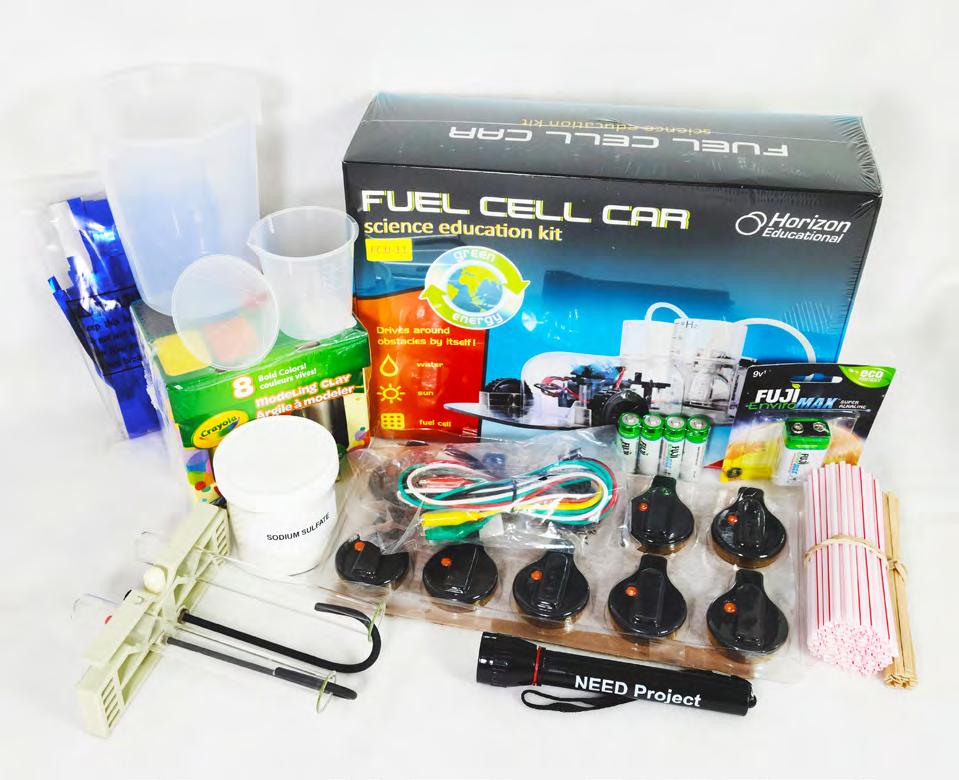
16 2023-2024 Resource Catalog and Planning Guide www.NEED.org
Teacher and Student Guides $6.00 H2 Educate Kit .......................................$450.00 Class Set of Consumables ............................. $85.00
HYDROPOWER CURRICULUM
Written at four levels, primary, elementary, intermediate, and secondary students learn about the water cycle, kinetic energy transformations, and electricity. The hydropower curriculum includes background information and hands-on, kit-based activities. Guides are included in the kits, but may also be purchased separately.
WATER AND ENERGY AND KIT
Grades K-2
Primary students are introduced to the forms of energy, properties of water as a solid, liquid, and gas, and the concept of moving water as an energy source through language arts and inquiry-based, hands-on activities. The kit includes a Teacher Guide, Student Guide, and the materials necessary to conduct the activities.

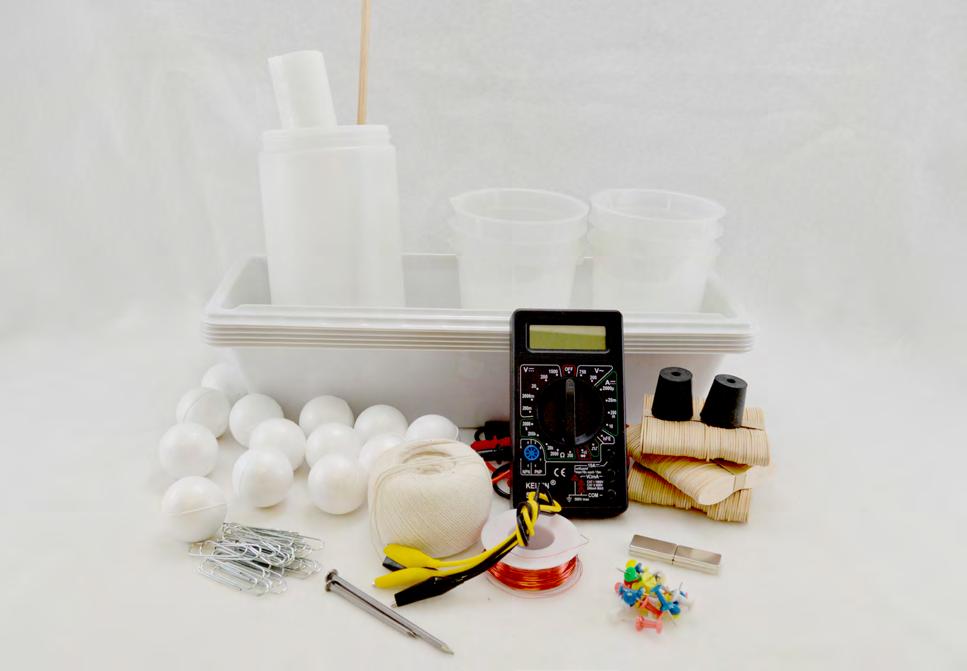


WONDERS OF WATER AND KIT
Grades 3-5
Elementary students learn about the forms of energy, electricity, electrical circuits, properties of water, the water cycle, and how water is used as an energy source through reading, hands-on investigations, and language arts activities. The kit includes a Teacher Guide, Student Guide, and the materials necessary to conduct the activities.
2023-2024 Resource Catalog and Planning Guide 17 www.NEED.org
Teacher and Student Guides $6.00 Water and Energy Kit $200.00 Class Set of Consumables $40.00
Teacher and Student Guides $6.00 Wonders of Water Kit $200.00 Class Set of Consumables $35.00
ENERGY OF MOVING WATER AND KIT
Grades 6-8
In this unit, intermediate students will develop a comprehensive understanding of energy, electricity, hydropower, and emerging ocean energy technologies through inquiry-based activities and background reading. The kit includes a Teacher Guide, Student Guide, and the materials necessary to conduct the activities. The kit also includes the materials needed to build six model hydropower turbines.
EXPLORING HYDROELECTRICITY AND KIT
Grades 9-12
These integrated and inquiry-based activities provide secondary students with a comprehensive study of the scientific, economic, environmental, technological, and societal aspects of hydropower. The kit includes a Teacher Guide, Student Guide, and the materials necessary to conduct the activities. The kit also includes the materials needed to build six model hydropower turbine generators.


EXPLORING MARINE HYDROKINETICS
Grades 9-12
These integrated and inquiry-based activities provide high school students with a look into the emerging industry of marine energy and hydrokinetics. These activities will help students to learn more about harnessing energy from waves, tides, currents, and more.
YOUR FUTURE IN HYDROPOWER
NEED has worked with the National Renewable Energy Lab to develop a hydropower unit for Career and Technology classrooms! This unit explores the “nuts and bolts” of everything related to conventional hydropower and take a deeper dive into career readiness skills.
YOUR FUTURE IN MARINE HYDROKINETICS
NEED has worked with the National Renewable Energy Lab to develop a marine energy unit for Career and Technology classrooms. This unit explores MHK, engineering and design, careers and more to help prepare students to join this emerging industry! Check out pages 34-35 for more information on these and other career and workforce development units.
18 2023-2024 Resource Catalog and Planning Guide www.NEED.org
Teacher and Student Guides ........................... $7.50 Energy of Moving Water Kit $500.00 Class Set of Consumables $100.00
Teacher and Student Guides ........................... $7.50 Exploring Hydroelectricity Kit $400.00 Class Set of Consumables $175.00
NUCLEAR ENERGY
Grades 6-12
Through background information and hands-on activities, students will learn the chemistry and physics of the uranium atom, the process of fission, how a nuclear power plant works, the history of nuclear energy, and its role in producing electricity. A culminating assignment at the close of the unit has students researching and preparing for a mock Nuclear Regulatory Commission hearing regarding the building of a new nuclear reactor. The guides each contain detailed teacher guides and instructional masters.
Energy From Uranium (6-8)
Exploring Nuclear Energy (9-12)
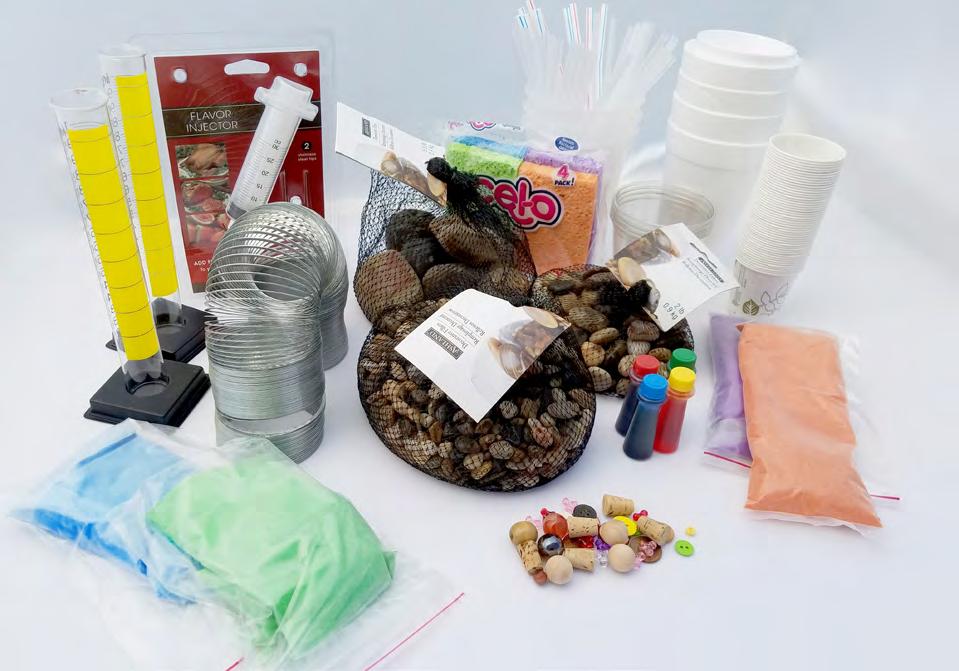
U.S. ENERGY GEOGRAPHY
Grades 4-12
This HTML-based resource includes U.S. maps covering all ten energy sources, energy production, energy consumption, and more! These maps are an excellent resource for any energy-related discussion or multi-disciplinary activity.
OIL & NATURAL GAS CURRICULUM

OIL AND NATURAL GAS AND KIT
Grades K-12
Through background reading and hands-on activities, students are introduced to oil and natural gas formation, composition and properties, exploration, production, processing, liquefaction, transportation, uses, and careers in the oil and natural gas industries. Students will explore sound waves, take core samples, examine physical properties of the rocks that trap oil and natural gas, and practice recovering fluids from various structures. The kit includes all three leveled guides for primary, elementary, and intermediate/secondary students with detailed teacher instructions, student worksheets, and necessary masters and manipulatives. The kit also includes a set of materials necessary to conduct the activities in a station style format.

FOSSIL FUELS TO PRODUCTS
Grades 7-12
Hands-on activities and background information introduce students to fossil fuels and the processes involved to create many of the products we use daily. Students learn about exploration, production, refining, chemical manufacturing, transportation, marketing, and uses of petroleum, natural gas, and their products in the industrial sector. Fossil Fuels to Products is great for upper intermediate students and secondary students and works very well with the Exploring Oil and Natural Gas kit shown above.
2023-2024 Resource Catalog and Planning Guide 19 www.NEED.org
Oil
Oil, Natural Gas, and Their Energy (K-2) $6.00 Wonders of Oil and Natural Gas (3-5) $6.00 Exploring Oil and Natural Gas (6-12) .................... $8.00
and Natural Gas Kit ...............................$250.00
SOLAR CURRICULUM
Written at four levels, primary, elementary, intermediate, and secondary students learn about solar energy transformations including solar energy to thermal energy and solar energy to electricity. All levels include hands-on investigations and activities. Guides are included in the kits, but may also be purchased separately.
THE SUN AND ITS ENERGY AND KIT
Grades K-2
Primary students are introduced to solar energy with a readaloud book and classroom-based activities. Students will learn that the sun’s energy produces light, transforms to heat, powers the water cycle, produces wind, and that solar cells convert radiant energy into electricity. The kit includes an allencompassing teacher and student guide and the materials necessary to conduct the activities.
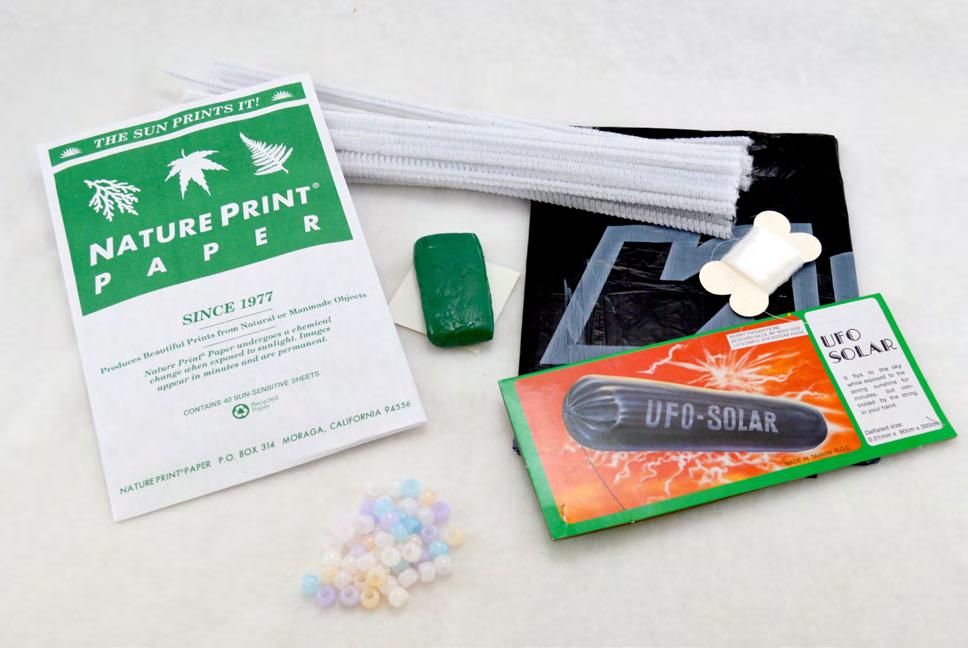
The Sun and Its Energy Guide $5.00
The Sun and Its Energy Kit $250.00 Class Set of Consumables ............................. $60.00
WONDERS OF THE SUN AND KIT
Grades 3-5
Elementary students develop a basic understanding of solar energy through background reading and classroom activities. Hands-on activities demonstrate solar energy transformations into kinetic energy, thermal energy, chemical energy, and electricity. The kit includes a Teacher Guide, Student Guide, and the materials necessary to conduct the activities.
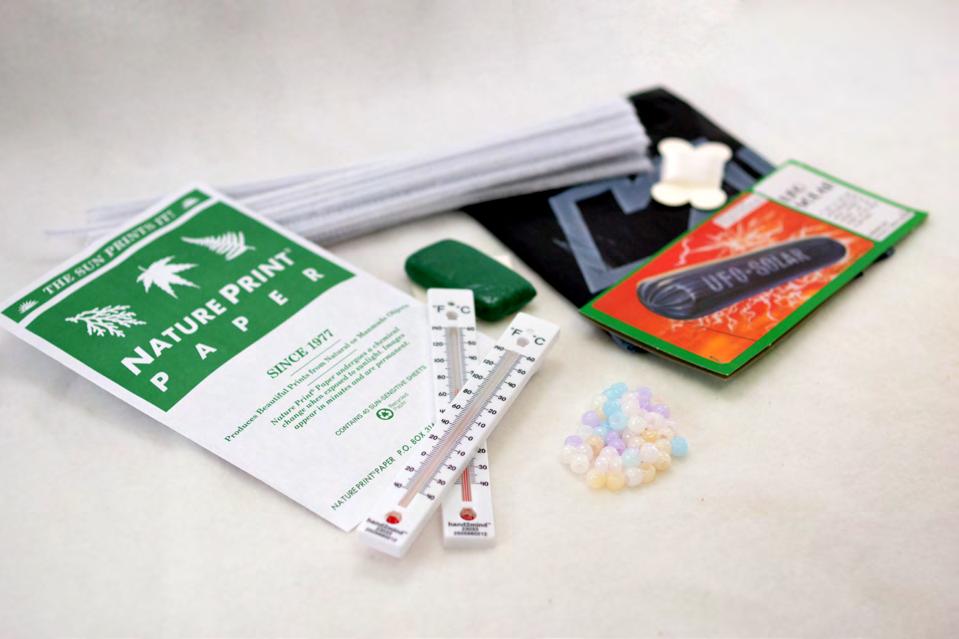
Teacher and Student Guides $5.00 Wonders of the Sun Kit $325.00 Class Set of Consumables $55.00


20 2023-2024 Resource Catalog and Planning Guide www.NEED.org
ENERGY FROM THE SUN AND KIT
Grades 6-8
Intermediate students learn about solar energy through investigations that explore radiant energy transforming into thermal energy, kinetic energy, chemical energy, and electricity. The kit includes a Teacher Guide, Student Guide, and the materials necessary to conduct the activities.


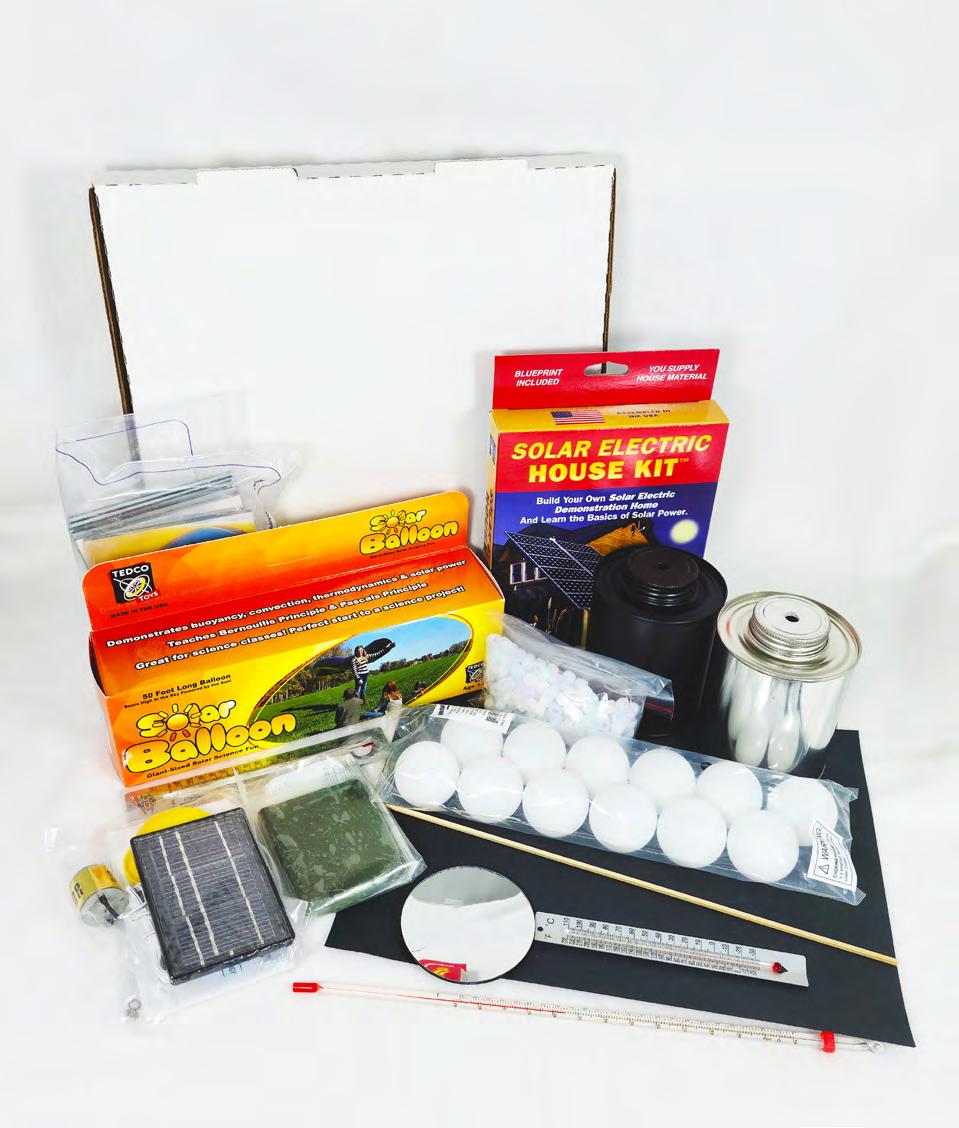
EXPLORING PHOTOVOLTAICS AND KIT
Grades 9-12
Secondary students learn how solar energy is used to generate electricity. Students are introduced to photovoltaic systems, concentrated solar power, and developing solar technolgies. Activities explore how photovoltaic cells work and what variables affect their electrical output. The kit includes a Teacher Guide, Student Guide, and the materials necessary to conduct the activities.
SCHOOLS GOING SOLAR
Grades 6-12
This guide provides lessons and activities to support and incorporate installed photovoltaic systems and their data into the classroom learning environment. It is an excellent supplement to the solar curriculum shown on pages 20-21.
2023-2024 Resource Catalog and Planning Guide 21 www.NEED.org
Teacher and Student Guides ........................... $5.00 Energy From the Sun Kit $325.00 Class Set of Consumables $40.00
Teacher and Student Guides $5.00 Exploring Photovoltaics Kit $325.00
WIND CURRICULUM
Written at four levels, primary, elementary, intermediate, and secondary students learn about wind formation, the history of wind use, and how wind is used to generate electricity. All levels include multiple hands-on investigations and activities. Guides are included in the kits, but may also be purchased separately.
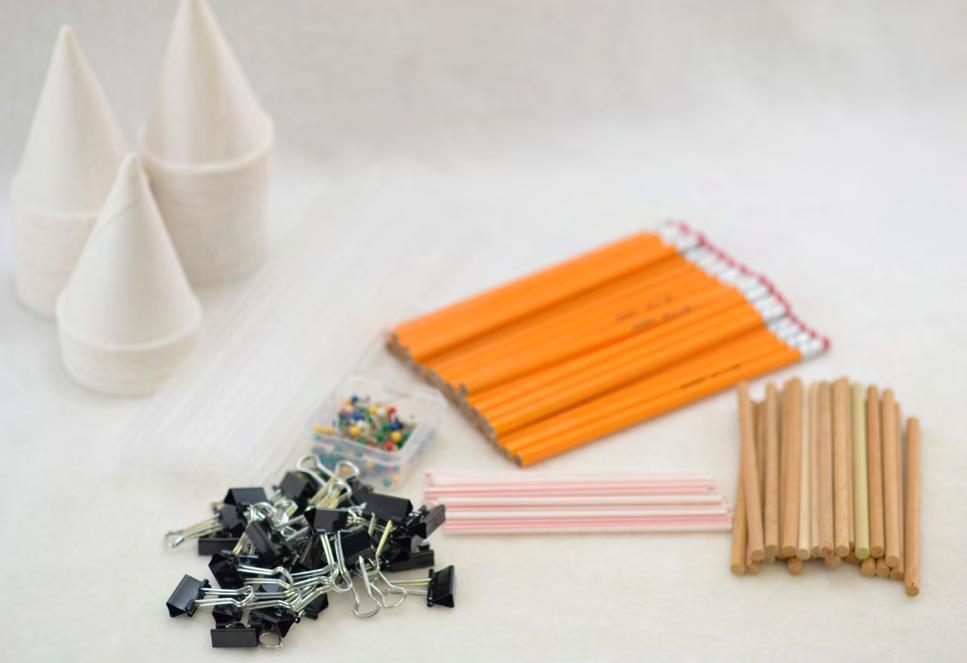
WIND IS ENERGY AND KIT
Grades K-2
Students begin to develop an understanding of how wind is formed and used as an energy source through hands-on activities and teacher-supported reading. Students will learn to measure wind speed and direction, and investigate how wind can do work. The kit comes with a Teacher Guide, Student Guide, and the materials necessary to conduct the activities, including two KidWind™ Weightlifter Turbines.


Teacher and Student Guides ............................$6.00 Wind is Energy Kit ................................... $325.00 Class Set of Consumables $62.00
WONDERS OF WIND AND KIT

Grades 3-5
Elementary students learn about wind through reading and activities that focus on observation and inquiry. Students will learn to measure wind speed and direction, and will investigate how wind does work and generates electricity. The kit comes with a Teacher Guide, Student Guide, and the materials necessary to conduct the activities, including one KidWind™ Weightlifter Turbine and one KidWind™ Geared Turbine.
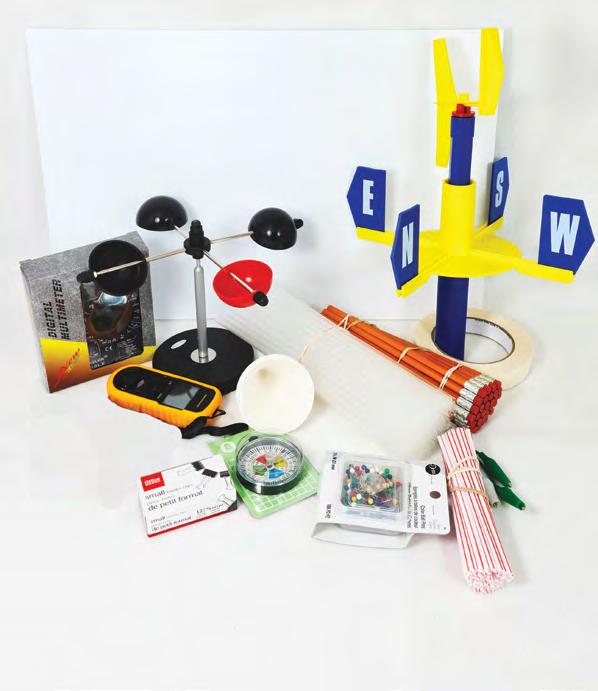
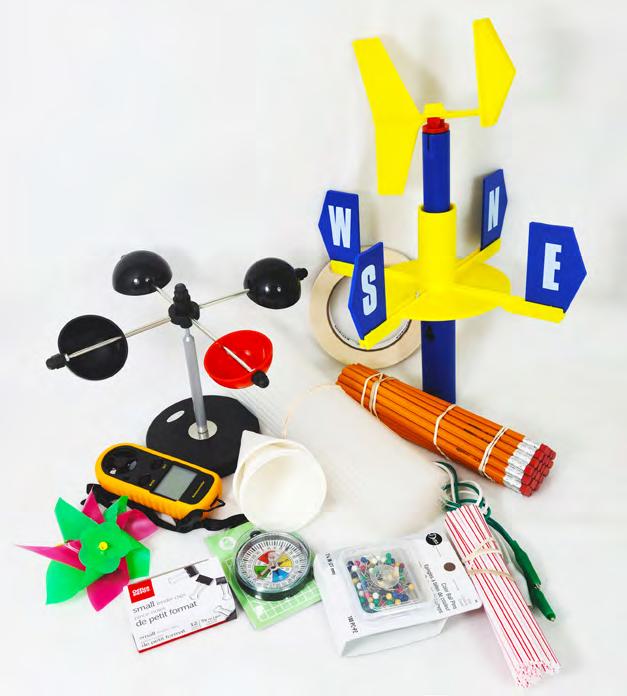
22 2023-2024 Resource Catalog and Planning Guide www.NEED.org
Teacher
Wonders
Class Set of Consumables $55.00
and Student Guides ............................$6.00
of Wind Kit ................................. $350.00
ENERGY FROM THE WIND AND KIT
Grades 6-8
Intermediate students develop a comprehensive understanding of wind formation, wind energy, and electricity generation from wind through reading, critical thinking activities, hands-on investigations, and engineering challenges. The kit comes with a Teacher Guide, Student Guide, and the materials necessary to conduct the activities, including two KidWind™ Geared Turbines.
EXPLORING WIND ENERGY AND KIT
Grades 9-12
These hands-on, critical thinking activities help students to develop a comprehensive understanding of the scientific, economic, environmental, technological, and societal aspects of wind energy. Students are challenged to design the optimum blades for a turbine and consider the best place to locate a turbine. The kit comes with a Teacher Guide, Student Guide, and the materials necessary to conduct the activities, including two KidWind™ Geared Turbines.


OFFSHORE WIND ENERGY
Grades K-12
Through hands-on, multi-disciplinary activities and background reading, students learn about generating electricity from wind in the offshore setting. This unit, developed in partnership with Dominion Energy Charitable Foundation, is centered around what will become the largest offshore wind development in the U.S., located in coastal Virginia waters. However, the unit is great for exploring this growing industry across the globe, as students take a closer look at fixed bottom foundation wind turbines, and the economics, engineering, careers, and environmental considerations involved with bringing offshore wind energy to the people. The offshore wind curriculum kits are very similar to NEED’s standard wind kits featured above, with a few additions and substitutions. A full listing of contents can be found by heading to shop.need.org/collections/offshore-wind.
Offshore Wind Is Energy (K-2))……………………………….… $325.00
Wonders of Offshore Wind (3-5)…………………………………$375.00
Energy from Offshore Wind (6-8)………….…….…….…….… $550.00
Exploring Offshore Wind (9-12)……….…….…….…….…….…$600.00
FLOATING OFFSHORE WIND
Grades 6-12
This unit was created in partnership with the U.S. Bureau of Ocean Energy Management (BOEM) and the National Renewable Energy Lab (NREL). This unit provides students with hands-on activities and background information to understand the emerging technology of floating offshore wind turbines, and why they might be selected for use in place of fixed-bottom systems. This unit is an excellent supplement to the wind curriculum shown on pages 22-23.
WIND FOR SCHOOLS
Grades 4-12
This guide provides lessons and data-driven activities to support and incorporate small wind systems into the classroom learning environment. It is an excellent supplement to the wind curriculum shown on pages 22-23.
YOUR FUTURE IN WIND ENERGY
NEED has worked with the National Renewable Energy Lab to develop a wind energy unit for Career and Technology classrooms. This unit explores the “nuts and bolts” of everything related to wind energy, both offshore and onshore, as students take a deeper dive into career readiness skills. See pages 35 for more information.
2023-2024 Resource Catalog and Planning Guide 23 www.NEED.org
and Student Guides
Energy From the Wind Kit $550.00 Class Set of Consumables ............................. $55.00
Teacher
$5.00
Teacher
Exploring Wind Energy Kit $550.00 Class Set of Consumables $55.00
and Student Guides $5.00
STEP THREE
ELECTRICITY AND MAGNETISM
COAL, HYDROGEN, HYDROPOWER, OIL & NATURAL GAS, NUCLEAR, SOLAR, AND WIND
These sources of energy units each include information on electricity generated from the renewable and nonrenewable sources that power our nation. Each source contributes differently to electric power generation and the activities and text within each guide address its generation, delivery to customers, technologies available, and even related careers.
See descriptions of the curricula and kit inclusions on pages 15-23.
BASELOAD BALANCE
Grades 3-12
This activity set demonstrates how electricity supply is transmitted on the electric grid to consumers while encouraging students to explore the differences between baseload and peak demand power, and how power companies and grid operators maintain supply to ensure customers have power as they need it. The activity is designed as a simulation for upper-level students, or a demonstration with a double pan balance for younger students.
CURRENT ENERGY AFFAIR
Grades 6-12
This activity is modeled after a television news broadcast, with studentcorrespondents reporting on seven major areas of electric power generation.
ELECTROWORKS
Grades 4-7
This guide includes background information and hands-on experiments that explore the basic concepts of atomic structure and electricity. Center-based experiments on static electricity, batteries, magnets, electromagnetism, and circuits are included.
ENERGY EXPOS
Grades 4-12
Students work in groups to develop hands-on exhibits and make presentations to teach others. Teacher and student directions for exhibits that focus on electricity are included.
ENERGY GAMES AND ICEBREAKERS
Grades K-12
Energy Games and Icebreakers contains many games and activities that include or can be modified to cover electricity generation and transmission. Be sure to check out “Electric Connections,” where students work individually and collaboratively to rank and debate the sources of energy for electricity generation before researching to find out their actual contributions.
THE SCIENCE OF ELECTRICITY AND KIT
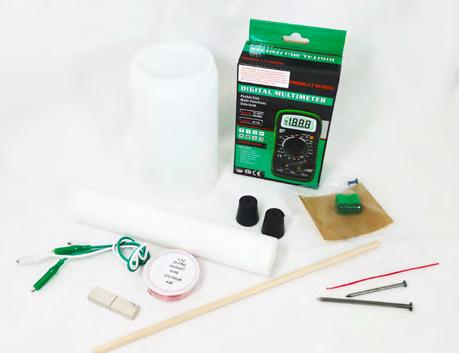
Grades 5-12
This engineering and design activity tasks students with assembling their own generator model, using magnets, wire, and simple lab items. After assembling the model to specifications and observing its function, students can aim to optimize the design of the model, utilizing fewer or less costly materials to generate a larger amount of electrical output – a real-world challenge for electrical engineers. The Science of Electricity can be downloaded individually, but is also found within several of NEED’s energy source units including coal, hydropower, and nuclear.
Science of Electricity Model Kit ..................................... $70.00
ENERGY INFOBOOKS AND INFOBOOK ACTIVITIES
Grades K-12
Energy Infobooks have extensive information on electricity. Energy Infobook Activities contains activities to accompany the electricity factsheets. All four levels of the Energy Infobooks are contained in the NEED Curriculum Packet. They are revised and updated annually.
See page 13 for Infobook pricing and availability.
ENERGY STORIES AND MORE
Grades K–5
This guide contains a series of stories and hands-on activities that can be used to introduce basic energy concepts, such as electricity, to primary and elementary students.
MISSION POSSIBLE
Grades 9-12
Mission Possible is an activity in which students are challenged to develop an energy plan to provide more electricity for a growing country. Students consider the advantages and disadvantages of the energy sources available for them to use so that they can increase electricity production while maintaining environmental quality and quality of life.
RELIABLY SMART
Grades 3-12
Students will learn about today’s electric grid in this series of hands-on and multi-disciplinary activities. Developed in partnership with Generac, this guide helps students to explore electricity generation, transmission, storage, microgrids, smart systems and metering, and more!
WONDERS OF MAGNETS
Grades 1-4
Students explore the basics of magnets and magnetism through background reading and hands-on, center-based experiments.
24 2023-2024 Resource Catalog and Planning Guide www.NEED.org
ENERGY AND OUR RIVERS - VINTAGE NEED
Grades 6-12
This module examines how energy sources are transported along the nation’s rivers. Hands-on science and social studies activities encourage students to think about the importance of rivers as modes of transportation.
ENERGY EXPOS
Grades 4–12
Students work in groups to develop hands-on exhibits and make presentations to teach others. Teacher and student instructions for exhibits focusing on transportation fuels and other energy topics are included in this guide.
ENERGY STORIES AND MORE
Grades K-5
This guide contains a series of stories and hands-on activities that can be used to introduce basic energy concepts including transportation to primary and elementary students. For example, students learn about the formation of petroleum in “Under The Sea,” drilling for oil in “Into Deep Water: Drilling for Oil and Gas,” and about the oil embargo of 1973 in “A Car Trip for Carlos.” Supplemental activities are included along with each story.
H2 EDUCATE
Grades 6-12
This intermediate and secondary unit introduces students to hydrogen as an important energy carrier for the future, both as a fuel for distributed electricity generation and as a transportation fuel.
See page 16 for kit details and pricing.
HYBRID BUSES - VINTAGE NEED
Grades K–12
These guides teach students about hybrid electric buses and encourage them to evaluate the economic and environmental advantages and disadvantages of such vehicles.
Hybrid Buses (K-5)
Exploring Hybrid Buses (6-12)
TRANSPORTATION
Grades 2-10
Students of all ages take an interest in transportation. In these guides, students will become familiar with modes of transportation, fuels used for transportation, and emerging technologies in transportation. Student backgrounders, vocabulary and math activities, and handson lab activities will help students to develop an understanding of the economic, environmental, and societal impacts of using various transportation fuels to move people and goods, and how they can become educated consumers as they choose how they get around.
Transportation Exploration (2-5)
Energy on the Move (6-10)
TRANSPORTATION FUELS DEBATE
Grades 6-12
Students evaluate the advantages and disadvantages of conventional and alternative transportation fuels in a debate format. Teacher instructions and instructional masters are included to help students develop arguments on the merits of each fuel.
TRANSPORTATION FUELS ENIGMA
Grades 7-12
Students put on their detective hats to research clues and uncover energy facts about transportation fuels in this cooperative learning activity. Teams use reading, critical thinking, and organizational skills to conceal the identity of their transportation fuel while trying to guess which fuels the other teams represent. Teacher instructions and instructional masters are included.
TRANSPORTATION FUELS LIVE!
Grades 4-12
Student musical groups write songs and sing about transportation fuels in this amped up activity. Audiences learn more from these energy stars as they tell their stories to interviewers out to get the latest scoop. Teacher and student instructions are included, along with sample songs and interviews to get students rockin’ and rollin’.
2023-2024 Resource Catalog and Planning Guide 25 www.NEED.org
STEP FOUR
NEED curriculum is wonderful, hands-on, and informative. It gets kids interested in things they cannot see, like energy.”
“
– K-12 teacher
TRANSPORTATION
EFFICIENCY, CONSERVATION, & CLIMATE
UNDERSTANDING CLIMATE SCIENCE AND KIT
Grades 6-8
In the middle school climate unit, students will apply basic chemistry knowledge to begin to look closely at climate science and changing climate through hands-on, critical thinking activities. Activities explore the basics of carbon molecules, the behaviors of carbon dioxide, greenhouse gases and the greenhouse effect, the carbon cycle, land and sea ice, and energy consumption as it relates to carbon dioxide emissions. The kit includes a combination Teacher/Student Guide and all the materials necessary to conduct the activities.
EXPLORING CLIMATE SCIENCE AND KIT
Grades 9-12
In this module, secondary students get a comprehensive look at climate science and changing climate through hands-on, critical thinking activities. Activities explore the basics of carbon molecules, the chemistry and behaviors of carbon dioxide, greenhouse gases and the greenhouse effect, the carbon cycle, ocean acidification, and energy consumption as it relates to carbon dioxide emissions. The kit includes a combination Teacher/Student Guide and all the materials necessary to conduct the activities.


CARBON CAPTURE, UTILIZATION, AND STORAGE
Grades 9-12
This guide incorporates informational text and hands-on explorations to teach students about the properties of carbon dioxide. Students also explore existing and developing technologies that allow carbon to be captured from stationary sources, utilized for production, or stored in geologic formations.
CHEMISTRY AND ENERGY EFFICIENCY

Grades 9–12
In this web-based curriculum, teachers and students take an in-depth look at chemistry in daily life, the use of energy by the chemistry industry, life cycles of products and activities, careers in the chemistry industry, and the impact the chemistry industry has on carbon dioxide production and climate change. Chemistry and Energy Efficiency can be viewed at www.NEED.org/Files/chemistry/ChemistryHome.html.
26 2023-2024 Resource Catalog and Planning Guide www.NEED.org
STEP FIVE
OFF
Teacher/Student Guide .......................................... $6.00 Exploring Climate Science Kit ................................. $250.00
Teacher/Student Guide ..........................................
Understanding Climate Science Kit ............................ $250.00
$6.00
EFFICIENCY, CONSERVATION & CLIMATE CURRICULUM
SCHOOL ENERGY INSPECTORS
Grades 3-5
Elementary students are introduced to the basic concepts of energy use and energy efficiency and conservation, using the school setting as the laboratory for developing observations and collecting energy data. Lessons and activities in this unit have been designed in a series to build on one another, providing all the foundations elementary learners need to conduct a guided student energy audit of their classroom learning space. Students are encouraged to teach other classrooms energy saving behaviors and recognize each other for good energy-saving habits. The kit includes a Teacher Guide, Student Guide, rewards, and the tools and materials necessary to measure and observe energy use.
SCHOOL ENERGY EXPERTS
Grades 6-8
Intermediate students are introduced to the concepts of energy, energy consumption, conservation and efficiency, and the economic and environmental effects of consuming energy. Hands-on activities in this unit use the school as a real-world laboratory to measure energy consumption in the school setting, while quantifying costs and impacts to their budget and their local environment. The lessons build upon one another, allowing students to explore heating and cooling, electricity, and lighting, before culminating in a building-wide audit. The kit includes a Teacher Guide, Student Guide, and the tools and materials necessary to conduct the activities.
Experts Kit $375.00 Class Set of Consumables ............................. $55.00
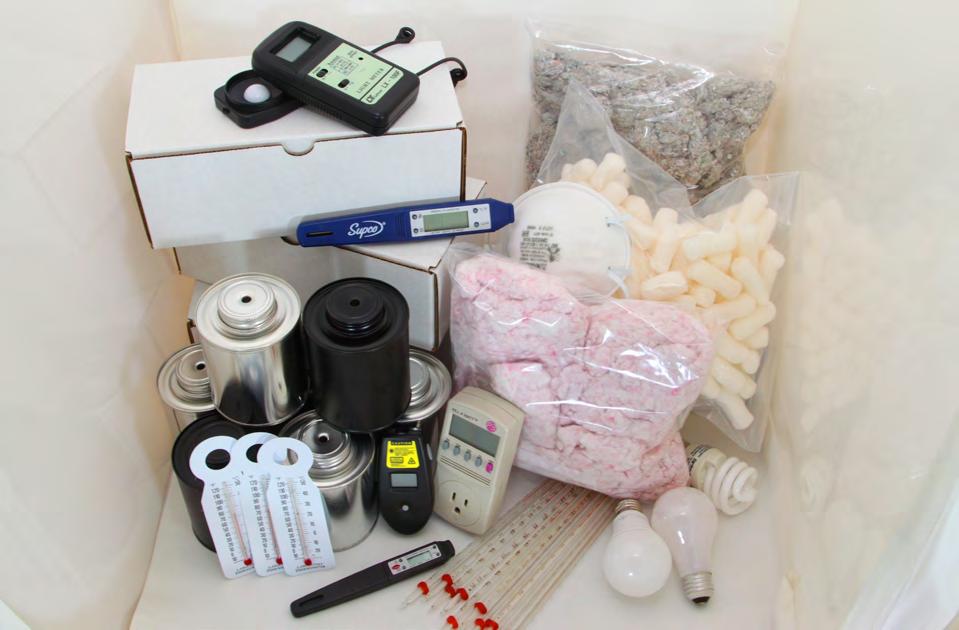
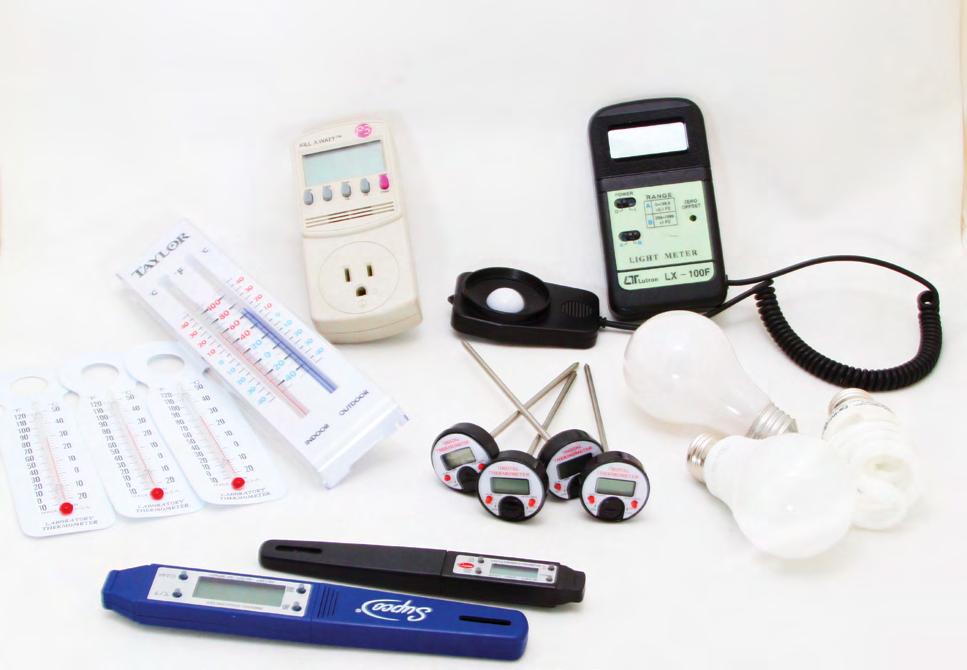
ENERGY CONSERVATION CONTRACT

Grades 4-12
In this outreach activity, students learn about energy conservation and ask their families to sign contracts in which they agree to save energy. Students then calculate the energy savings, and re-evaluate their conservation measures.
ENERGY EXPOS
Grades 4-12
Students work in groups to develop hands-on exhibits and make presentations to teach others. Teacher and student directions for exhibits that focus on energy sources, transportation fuels, and energy conservation are included.
ENERGY GAMES AND ICEBREAKERS
Grades K–12
This guide contains entertaining introductory energy activities and games that also reinforce efficiency and conservation measures. Activities include “Energy Chants”, “Energy Bingo”, “America’s Most Wanted Energy Wasters”, “Energy Web Game”, and more!
2023-2024 Resource Catalog and Planning Guide 27 www.NEED.org
$6.00 School
$275.00
Teacher and Student Guides
Energy Inspectors Kit
$6.00 School
OFF
Teacher and Student Guides
Energy
SCHOOL ENERGY MANAGERS
Grades 9-12
High school students get a first-hand glimpse at career applications and managing their energy use as they explore efficiency and conservation in this set of hands-on activities. The unit has been designed to reinforce student knowledge about energy sources and efficiency and conservation, while students assume the role of an energy manager to monitor school energy consumption data and change behaviors. School Energy Managers serves well as the classroom education component of a total energy management plan for secondary schools. Students will explore thermal energy and insulation, vapor barriers, ventilation, electricity, and lighting, as they analyze their building and develop comprehensive management and conservation plans for their buildings. The kit includes a Teacher Guide, Student Guide, and the tools and materials necessary to conduct the activities.
BUILDING SCIENCE AND KIT
Grades 6-8
This unit teaches the science involved with keeping building occupants healthy and comfortable and the buildings energy efficient. Activities introduce the house as a system as students explore conduction with insulation materials, investigate heat transfer using infrared thermometers, simulate home airflow, and test building performance measures. The kit includes an all-encompassing teacher and student guide, and all of the tools and materials necessary to conduct the activities.
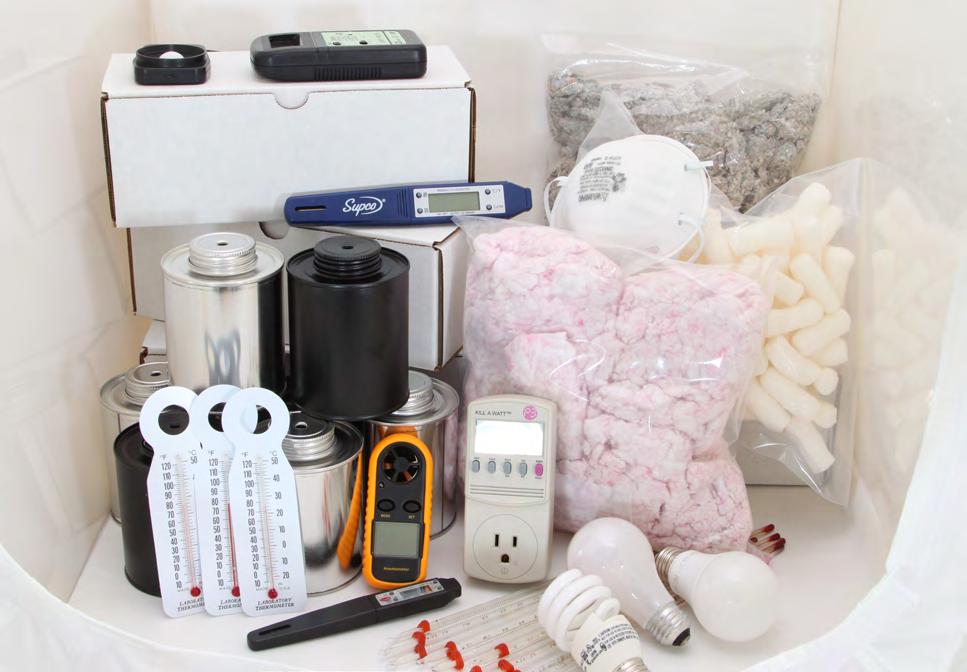
FOR ADMINISTRATORS AND FACILITIES STAFF & TRAINING BLUEPRINT FOR SCHOOL ENERGY TEAMS
MANAGING HOME ENERGY USE
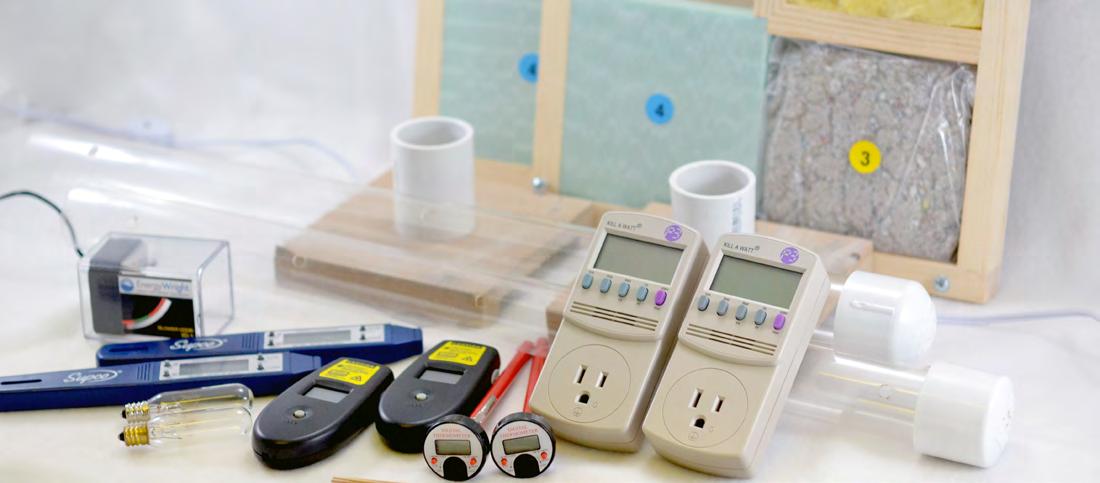
Grades 3-12
Managing Home Energy Use is an at-home supplement to NEED’s School Energy unit. These activities follow the same six-lesson format as the in-school guides, and expand upon the energy efficiency and conservation knowledge gained while using the home as the learning laboratory. Students will work to apply observations from in-school lessons and teach their households about their knowledge gains and energy behavior changes as they conduct a step-by-step audit of their homes. Activities will help homeowners uncover energy and money saving actions right away. For more information on purchasing supplies for home energy use activities, contact NEED. Home kit supplies can be ordered for large groups.

This guide is an excellent tool for schools seeking to lower energy related expenses through the formation of a student energy team and the adoption of school-wide energy policies. School leaders and administrators will find a comprehensive plan for getting started and managing ongoing programs while involving their student body. NEED’s building operators and Certified Energy Managers can also lead buidling staff and students in trainings that help make the best use of energy technologies and behaviors.
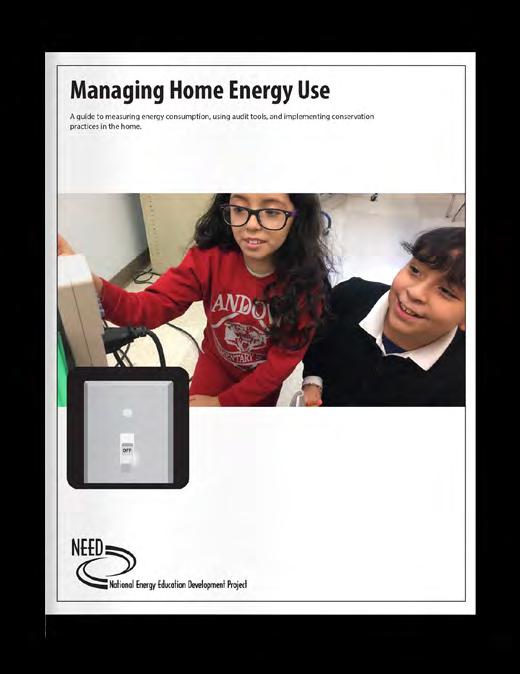
28 2023-2024 Resource Catalog and Planning Guide www.NEED.org
Teacher and Student Guides $6.00 School Energy Managers Kit $375.00 Class Set of Consumables ............................. $55.00
Teacher/Student Guide ......................................... $6.00 Building Science Kit ........................................... $525.00
ENERGY HOUSE
Grades 3-12
In this activity, students learn about efficiency, conservation, and diminishing returns by using various materials to build and insulate a model house and then test its efficiency.


ENERGY INFOBOOKS
Grades K-12
Energy Infobooks are a great supporting resource for many NEED activities and include an introduction to energy, information on major sources of energy, new technologies, energy conservation, electricity, climate change, and other energy information. They are available on four reading levels and are revised and updated annually.
See page 13 for pricing.
PLUG LOADS
Grades 6-12
This unit guides students through an in-depth investigation of electricity consumption by appliances and machines in the school building. Students gather data, calculate energy use and economic and environmental costs over time, and determine ways to reduce consumption. Students also explore phantom or vampire loads and the many operational modes electrical devices employ. Instructional masters are included and digital copies of spreadsheets are available at shop.NEED.org
SOLID WASTE, ENERGY, AND RECYCLING
Grades K-12
Students learn about solid waste, its relationship to natural resources and energy, and options for handling solid waste including recycling, landfilling, waste-to-energy plants, and incineration.

All About Trash (K-2)
Talking Trash (3-5)
Museum of Solid Waste and Energy (6-12)
TODAY IN ENERGY
Grades K-8
These activities introduce students to the economics of energy use. Choices, trade-offs, and costs are explored using math and critical thinking skills.
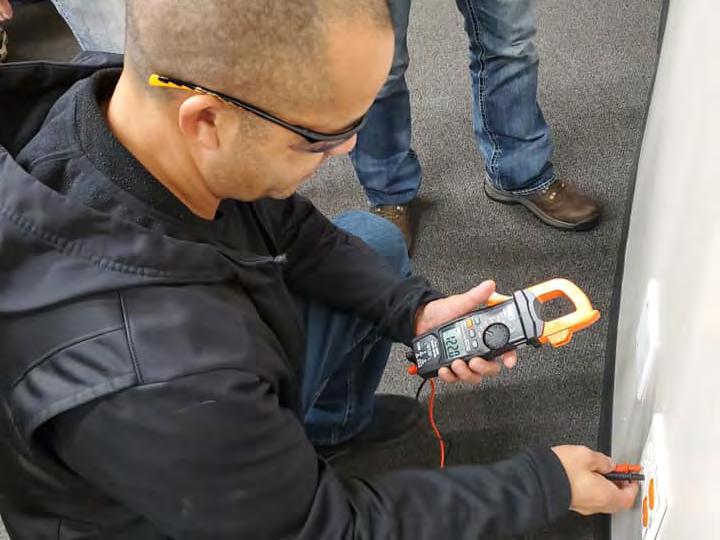
USING AND SAVING ENERGY
Grades K-2
This guide introduces students to basic concepts of energy use and conservation at home in a read-aloud format and provides suggested activities.
2023-2024 Resource Catalog and Planning Guide 29 www.NEED.org
STEP SIX
SYNTHESIS AND REINFORCEMENT
DIGITAL ENERGY
Grades 5-12
In Digital Energy students are tasked with researching an energy topic and creating a digital media presentation that teaches others about their topic. Throughout the project, students will analyze the importance of graphic elements in learning and presenting, and must synthesize the information they read to create their own graphics. Digital Energy projects also encourage students to prepare a script, write an assessment for their audience, and facilitate discussion after presenting. This activity is great for differentiated environments and multi-disciplinary classrooms, and can be a great building block after completing Energy Expos in your classroom.
ENERGY ANALYSIS - VINTAGE NEED
Grades 7-12
This activity emphasizes research and analysis of information in graph format. Activities encourage students to discern energy trends using the Energy Information Administration’s raw data and reports and additional graphs within the Teacher Guide. Students will also analyze energy trends based on historical and societal events.
ENERGY AROUND THE WORLD - VINTAGE NEED
Grades 5-12
This guide includes maps and energy information for countries around the globe. Student groups research assigned countries and make presentations to the class that compare the United States’ energy use to energy use around the world.
ENERGY CARNIVALS
Grades K-8
NEED’s popular carnival games are an excellent way to encourage students and adults to think about energy. Energy Carnival contains complete instructions and reproducible masters for carnival games focusing on energy and energy efficiency. Energy Carnival is ideal for elementary or middle school students and makes an excellent activity for an energy fair or Earth Day celebration. Primary Energy Carnival contains similar games leveled appropriately for students in grades K-3.
Primary Energy Carnival (K-3)
Energy Carnival (4-8)
ENERGY FAIR
Grades 1-5
This module is a guide to teaching students experimental design with an emphasis on developing energy-related science fair projects. Sample science projects are also available on the NEED website at www.NEED.org/need-students/science-fair-projects/
ENERGY GAMES AND ICEBREAKERS
Grades K-12
This guide contains entertaining activities to introduce energy, efficiency, and conservation to students, as well as reinforce the information that has already been presented.
ENERGY IN THE BALANCE
Grades 3-5
This activity encourages elementary students to evaluate the advantages and disadvantages of the major energy sources through a series of charting and graphing activities.
ENERGY JEOPARDY
Grades 4-12
Students will enjoy NEED’s spin on the popular trivia game show. Jeopardy categories that help to reinforce your energy unit include: More MPGs, Famous Americans in Energy, Leading Nations, and more. A digital version of the game is available at shop.NEED.org
ENERGY LIVE!
Grades 4-12
In this amped-up activity, student musical groups write songs and sing about energy sources, electricity, and conservation and efficiency. Audiences learn more from these energy stars as they tell their stories to interviewers out to get the latest energy scoops. Teacher and student instructions are included, along with sample songs and interviews to get students rockin’ and rollin’.
ENERGY MATH CHALLENGE
Grades 3-12
Energy Math Challenge strengthens students’ math and critical thinking skills while increasing their knowledge of energy. Students work individually or in teams to solve energy math problems.
30 2023-2024 Resource Catalog and Planning Guide www.NEED.org
It’s extremely nice to see curriculum for Tech Ed and CTE related. I did not have to take the materials and convert it to meet CTE Tech Ed objectives.
– 6-8th grade teacher
“
ENERGY ON STAGE
Grades 4-12
This resource uses plays and poems to reinforce the energy sources and energy conservation. Each play includes an individual teacher guide that has expanded vocabulary and activity extensions.
GLOBAL TRADING GAME
Grades 5-12
In this cooperative learning activity developed by the Ohio Energy Project, students become economic advisors, geologists, international traders, and miners as they analyze their assigned country’s resources and needs, then trade resources with other countries to enhance their economic position and environmental quality.
GREEK MYTHOLOGY AND THE FORMS OF ENERGY
Grades 4-8
This guide provides resource materials and a teacher guide for incorporating Greek mythology into your science curriculum. This innovative interdisciplinary activity focuses on the forms of energy and was developed by Donna Quillen of North Carolina.
MYSTERY WORLD TOUR
Grades 4-8
In this activity, students identify the energy challenges of different countries around the world and compare them to the United States. Students create a proposal and a presentation to share with the class, who will tour and try to identify each mystery nation.
NEED SONGBOOK
Grades K-12
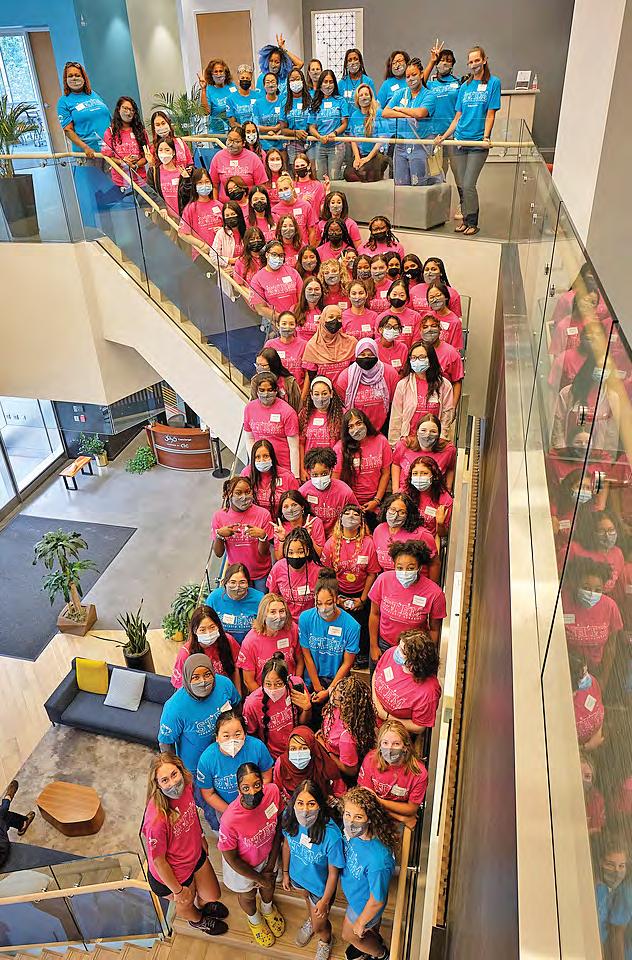
Reinforce energy concepts and sing along to NEED’s favorite songs, including “The NEED Clap”, “ NEED students are High-Minded”, “E-N-E-RG-Y”, and” What Do You Do With An Energy Waster?”
YESTERDAY IN ENERGY
Grades 4-8
This activity allows students to travel back in time without leaving the classroom. Students conduct interviews and do research to learn about and create exhibits depicting energy use in the good old days.

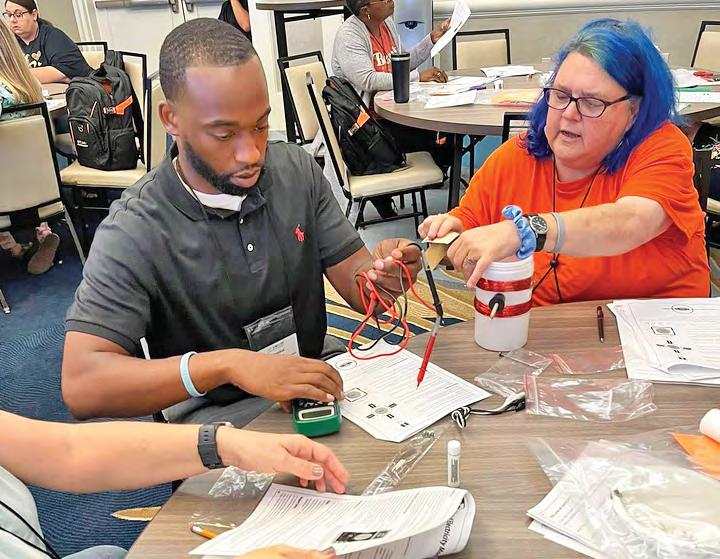
2023-2024 Resource Catalog and Planning Guide 31 www.NEED.org
I love the hands on curriculum. This helps all learners visual, audio, and tactile.”
“
– 4th grade teacher
STEP SEVEN EVALUATION
Evaluation and assessment are important components of any energy unit and should be ongoing. NEED offers many assessment and evaluation tools for teachers to use. Check out NEED’s assessments and evaluation page for more information, example rubrics, and other tools: www.NEED.org/educators/evaluations-assessment/.
ENERGY POLLS
Grades K-12
Use one of NEED’s Energy Polls prior to beginning your unit and as you close your unit. There are polls on four reading levels—primary, elementary, intermediate, and secondary. Polls can be returned to NEED for analysis. Show us what your students are learning!
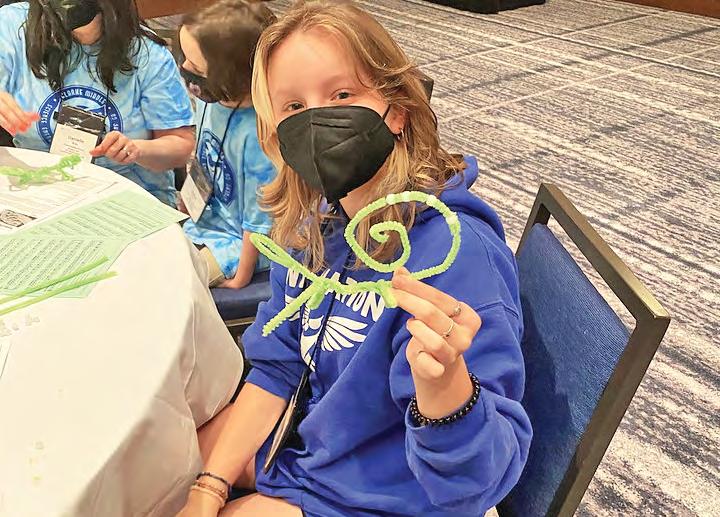

Many NEED guides and activities also contain unit exams and suggestions for how to evaluate student performance. Please feel free to modify these suggestions as necessary. Download the basic polls at www.NEED.org/educators/evaluations-assessment/
QUESTION BANK

Grades K-12
NEED’s online Question Bank gives teachers the ability to customize evaluation tools for their energy units. There are questions at four grade levels: primary, elementary, intermediate, and secondary. At each grade level, the questions are divided into the following topics: Science of Energy and Forms of Energy, Sources of Energy, Electricity, Transportation, and Conservation and Efficiency. Under each topic, knowledge, comprehension, multiple choice, and higher order thinking questions are included. You can access the online Question Bank at www.NEED.org/educators/evaluations-assessment/.
CURRICULUM CORRELATIONS
NEED has correlated all materials to meet relevant standards for learning. NEED materials support Next Generation Science Standards, Common Core State Standards for English/Language Arts and Mathematics, and individual state science standards, where applicable. Access the correlations files for the relevant standards by visiting NEED’s evaluation page or the correlations page, www.NEED.org/educators/ curriculum-correlations/.
32 2023-2024 Resource Catalog
Guide www.NEED.org
and Planning
The curriculum adds an extra dimension to the State Standards. With the materials and activities provided, they provided extra reinforcement needed for students to apply and retain what they’ve learned.“
“
– 6-8th grade teacher
STUDENT LEADERSHIP AND OUTREACH
An integral part of NEED’s curriculum is the Kids Teaching Kids approach. Students are most authentically assessed when they have to share their knowledge with others. Encouraging students to become leaders in the classroom and school also helps ensure that students are empowered to become good stewards for energy awareness in their communities.
ENERGY OUTREACH OVERVIEW
Step One –
Focus!
Effective energy outreach projects allow the whole class to get involved. Set your goals as a group. Identify the group(s) you want to reach with your activities. Do you want to focus on just your school, or do you want to include families, other schools, community leaders, senior citizens, or the whole community? It is also important to select the focus for your activities. Do you want to increase energy awareness, institute a schoolwide program, do a community demonstration, correct individual problems, or change community policy? Maybe you’ve identified several focus points or goals. Make a folder or poster for each goal in your project, and assign committees of students to work on each.
Step Two – Plan it Out!
Student committees should meet to create a plan for each goal. Plans should identify the objectives, activities, estimated time, potential costs, materials needed, and who will be involved with helping to accomplish each goal. Ask students to think outside the box – who can they incorporate from the community? All groups should meet and discuss the plans as a whole class to create a master plan. Identify dates for each task to be completed. Mark dates on a calendar or timeline for the whole class.
Step Three – Work it Out!
Group members should sign up for tasks or select tasks to complete. Assist groups to make sure they have enough manpower to complete their projects. Committee members should work together, meet together, and accomplish their goal(s) to make sure the project is completed. Make sure each group is documenting their activities and taking pictures to share with their community and NEED!
Step Four – Take Pride!
Evaluate the progress of the projects at group meetings and as a class. Ask community members or school partners to evaluate your progress and share in your successes. Summarize your efforts for each goal and the overall master plan.
NOW WHAT?
NEED encourages classrooms who complete energy outreach projects to turn their projects into Youth Awards Projects. The Youth Awards Program for Energy Achievement rewards students for their outreach efforts. Check out the descriptions below, learn more about the program and projects in our Youth Awards Program Guide, and visit NEED’s Youth Awards website: https://youthawards.need.org/
YOUTH AWARDS PROGRAM OVERVIEW
The Youth Awards Program for Energy Achievement is a central component of NEED’s evaluation and recognition, recognizing student leadership, encouraging students to evaluate their knowledge of energy, and providing ideas and programs that may be exchanged with other schools in the NEED program. NEED encourages all schools to participate in Youth Awards by having their students document their energy activities and projects and submit them to NEED for judging.
Students should keep track of their goals, activities, outreach opportunities, and their evaluations of their activities. Students will then create a digital project summarizing their efforts to submit for judging. Students can submit two different types of projects, depending on their engagement in the activities and outreach completed. The deadline for project submissions each year is April 15.
RECOGNITION
The Annual NEED Youth Energy Conference and Awards Program will give students opportunities to learn about energy and to explore energy in STEM (science, technology, engineering, and math). The annual June conference will have students from across the country working in groups on an Energy Challenge designed to stretch their minds and energy knowledge.
The Youth Energy Conference is held each year in Washington, D.C., in late June. The conference culminates with the Youth Awards Ceremony. Winning students whose projects fit the criterion for judging are eligible to attend the ceremony and network with students from across the country! Other projects will also be recognized at the local level for their outstanding efforts in the classroom and community.
YOUTH AWARDS PROGRAM GUIDE
For project descriptions and guidelines, application and submission procedures, and more information about the program and recognition ceremony, be sure to turn to NEED’s Youth Awards Program Guide. This guide serves as a handbook to outline the process of engaging your students in energy outreach, leadership, and fun. It also contains templates for student work, project suggestions and tips, and even the judging rubric! Also, check out https://youthawards.need.org/. The guide to the program can be downloaded here, as well as photos from past events, previous winning projects, and FAQs. We hope to see you in June!
2023-2024 Resource Catalog and Planning Guide 33 www.NEED.org
STEP EIGHT
CAREER & WORKFORCE DEVELOPMENT RESOURCES
NEED works with partners to provide career-focused content to support energy careers education for traditional and specialized classrooms. Career-focused content can be its own module, focused on preparing workers for a job in a certain field, or the career content can be contained within a standard classroomstyle unit to help reinforce content. Some units have associated kit contents available for purchase. For more information about partnering on future curriculum, or developing a training program, please contact NEED.
BUILDING SCIENCE
Grades 6-8
This unit teaches the science involved with keeping building occupants healthy and comfortable and the buildings energy efficient. Activities introduce the house as a system, explore conduction with insulation materials, investigate heat transfer using infrared thermometers, simulate home airflow, and test building performance measures. A kit is also available for purchase.

See page 26 for pricing.
COAL, HYDROPOWER, OIL & NATURAL GAS, NUCLEAR, AND WIND
These sources of energy units each include career profiles, career activities, and career resources for teachers and students. The secondary level guides will include the more robust content, but careers content is included from the elementary level upward. Check each teacher guide for a listing of activities, and examine the student informational texts for descriptions and career profiles.
See descriptions of the curricula and kit inclusions for each topic on pages 14-23.
INTRODUCTION TO SOLAR PHOTOVOLTAICS
Grades 9-12
This curriculum unit was developed in partnership with the Illinois IBEW Renewable Energy Fund and the Chicago Federation of Labor Workforce and Community Initiative. It is designed to provide high school seniors with a one-semester introduction to photovoltaics, from the science of their functioning through the basics of installation.
SCHOOL ENERGY CURRICULUM
Grades 3-12
This efficiency and conservation curriculum for the classroom, gives students some of the actual tools used by energy auditors to measure their energy consumption. School Energy Managers for high school students, School Energy Experts for intermediate students, and School Energy Inspectors geared for elementary students, each give students an introduction to energy consumption at the appropriate level as they work through hands-on activities. The unit culminates with students examining their building as a Certified Energy Manager or Auditor might do.
See pages 26-28 for pricing and more details.
YOUR FUTURE IN HYDROPOWER
This unit, created for use in Career and Technology Education programs and classrooms, contains hands-on activities to explore careers and opportunities within the hydropower industry. Students will get a comprehensive view of the tools, skills, and concepts necessary to prepare for a job in hydropower. Hands on activities in this unit cover everything from choosing the right tools, to gears, to water quality, and generating electricity. The kit includes a Teacher Guide, Student Guide, and tools and materials necessary to conduct most of the activities. Other necessary tools and materials can easily be gathered from the CTE classroom.
Teacher and Student Guides $7.00 Your Future in Hydropower Kit ................................ $525.00
34 2023-2024 Resource Catalog and Planning Guide www.NEED.org
CAREER & WORKFORCE DEVELOPMENT RESOURCES
SOLAR CAREERS PATHWAYS
Grades 9-12 or non-traditional
This unit, created in partnership with the Sacramento Municipal Utilities District (SMUD), introduces participants to career paths directly in or related to solar PV installation. It has been designed to be ten, four-hour sessions for high school seniors, recent graduates, or those seeking a career change. The unit is easily adapted to meet any combination of days to yield a total of 40 hours of training.
YOUR FUTURE IN MARINE HYDROKINETICS
Grades 9-12
NEED has worked with the National Renewable Energy Lab to develop a marine energy unit for Career and Technology classrooms. This unit explores MHK, engineering and design, careers and more to help prepare students to join this emerging industry!

YOUR FUTURE IN WIND ENERGY
Grades 9-12
NEED has worked with the National Renewable Energy Lab to develop a wind energy unit for Career and Technology classrooms. This unit explores the “nuts and bolts” of everything related to wind energy, both offshore and onshore, as students take a deeper dive into career readiness skills.

2023-2024 Resource Catalog and Planning Guide 35 www.NEED.org
“
The activities are fun, engaging, and easy for students to implement in class.
– 7th grade teacher
LOOKING FOR MORE?
CHECK OUT NEED’S CURRICULUM SAMPLERS PAGE





Sometimes NEED teachers and students have an interest in a hot topic or an emerging energy trend, but we don’t have enough for a full curriculum guide and kit. NEED has created many “samplers” over the years to test out new activities and content and highlight some of the favorite, oldies-but-goodies in our library. Curriculum samplers are a nice way to cover a topic in a short time frame, and are great for classrooms that are newer to energy in general or a topic in specific. Sampler activities are always set up with easy-to-source supplies for the classroom. Head to https://shop.need.org/collections/ curriculum-samplers to find Electric Vehicles and the Grid, H2OMG!, Sidekick Circuits, Energy Careers Excursion, and many more!
NEED OFFERS MINI-KITS OF SOME OF YOUR FAVORITE SINGLE ACTIVITIES



NEED’s student activity mini kits are a selection of favorite, tried-andtrue lessons that work well for individuals and large groups. Purchase single, fully assembled sets for activities like Energy House, Solar Oven, Sidekick Circuits, and Wind or Water Can Do Work. Visit https:// shop.need.org/collections/student-activities-kits to learn more!
SEASONAL FAVORITES
Have some extra time in-class around the holidays? Energy content flows nicely into discussing seasonal events and celebrations like Thanksgiving, or when decorating for a holiday. These activities are fun, hands-on, and encourage students to access some of their math and problem-solving skills. Check out our collection of energy-themed, seasonal guides and activities. All are available for free download in PDF format.
36 2023-2024 Resource Catalog and Planning Guide www.NEED.org
OFF Cost of Holiday Shopping Science Grade Levels: Pri Ele Int Sec Subject Areas: Secondary Math Intermediate Int Ele Elementary OFF Cost of a Thanksgiving Meal 2017-2018 Science Grade Levels: Pri Ele Int Sec Subject Areas: Secondary Math Intermediate Pri Ele Int Sec Elem Elementary
NEED MERCHANDISE
NEED T–SHIRTS
NEED t–shirts with the NEED 2022-2023 design. Shirts are available in adult sizes S-XXL. Call for availability.


T–Shirt (S, M, L, XL) ............................................. $12.00
POLAR BEAR AND FISH BUTTONS
Polar Bear and Fish Buttons for those who can figure out the answers to the fun riddles.
Polar Bear Button ............................................... $0.50

Fish Button ..................................................... $0.50
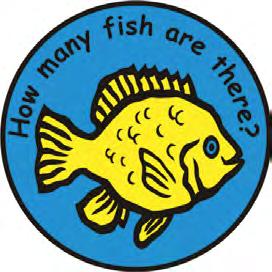
(Riddles can be found online at www.NEED.org)
ORDER MATERIALS ONLINE! SHOP.NEED.ORG
Anemometers and solar cells and light meters-- oh my! Getting your kits (or refills) has never been easier! Check out NEED’s official online store at shop.NEED.org
ADDITIONAL NEED MERCHANDISE
Did you attend a workshop or see a piece of merchandise online, but don’t see it listed in the catalog? NEED merchandise varies throughout the year and is not always included in the catalog. For questions about additional merchandise e-mail info@NEED.org, or call 1-800-875-5029.
ENERGY LAB FOR KIDS

Prepared by Emily Hawbaker and the expert team at The NEED Project, the lab activities in this book will let you explore almost everything about energy - what it is, how we find it, how we use it, and how we can save it. Written for at-home or classroom energy explorations, this guide works well for all ages, but is geared especially for elementary and middle school students.
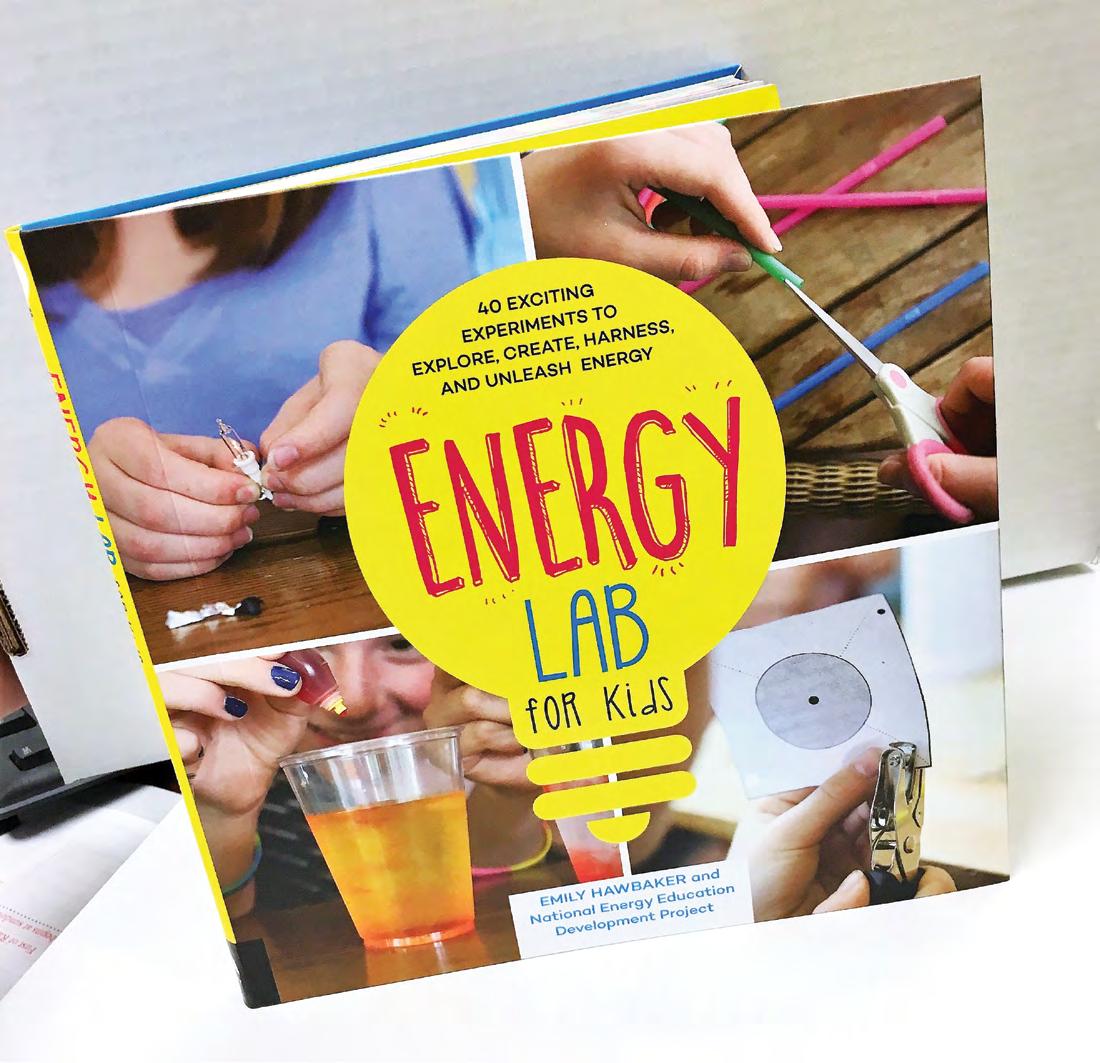
Energy Lab for Kids Book
$20.00
NEED PENS
NEED pens are made from recycled plastic with NEED information imprinted on the shaft.
Pen $1.50
NEED PENCILS
NEED pencils demonstrate thermal to chemical energy transformations! It only takes a few seconds for the thermal energy from your hand to change the color of the pencil. NEED information is imprinted in black. Pencil colors vary.
Pencil $0.50

2023-2024 Resource Catalog and Planning Guide 37 www.NEED.org
T-Shirt (XXL) ................................................... $15.00
38 2023-2024 Resource Catalog and Planning Guide www.NEED.org ITEM QUANTITY UNIT PRICE TOTAL
THE NEED PROJECT 8408 Kao Circle Manassas, VA 20110 Order Online at shop.NEED.org Fax Order Form To: 1-800-847-1820 For Questions Call: 1-800-875-5029 BILL TO: SHIP TO: Purchase Order # Name: School/Organization Address City State Zip (Area Code) Telephone Nomber Email Name: School/Organization Address City State Zip (Area Code) Telephone Nomber Email
you attend a NEED workshop? Yes No If so, please give the location:
Purchase Order Enclosed Date Needed: VISA MASTER CARD AMERICAN EXPRESS SUBTOTAL RUSH PROCESSING Less than 2 business days processing 15% of subtotal (Min. $7.00) SHIPPING Standard shipping 10% subtotal (Min. $7.00) Expedited shipping available. Please call for pricing. TOTAL Card # Expiration Date Security Code Signature
ORDER FORM
Did
Check is enclosed payable to The NEED Project
NEED NATIONAL SPONSORS AND PARTNERS
AES
AES Clean Energy Development
American Electric Power Foundation
Appalachian Voices
Arizona Sustainability Alliance
Baltimore Gas & Electric
Berkshire Gas - Avangrid
BP America Inc.
Bob Moran Charitable Giving Fund
Cape Light Compact–Massachusetts
Celanese Foundation
Central Alabama Electric Cooperative
The City of Cuyahoga Falls
Clean Virginia
CLEAResult
ComEd
Confluence
ConocoPhillips
Constellation
Delmarva Power and Light
Department of Education and Early Childhood Development - Government of New Brunswick, Canada
Dominion Energy Charitable Foundation
Dominion Energy, Inc.
DonorsChoose
East Baton Rouge Parish Schools
East Kentucky Power Cooperative
EcoCentricNow
EDP Renewables
EduCon Educational Consulting
Enel Green Power North America
ENGIE
Entergy
Eversource
Exelon
Exelon Foundation
Foundation for Environmental
Education
FPL
Generac
Georgia Power
Gerald Harrington, Geologist
Government of Thailand–Energy Ministry
Greater New Orleans STEM
GREEN Charter Schools
Green Power EMC
Guilford County Schools–North Carolina
Honeywell
Iowa Governor’s STEM Advisory Council - Scale Up
Iowa Lakes Community College
Iowa State University
Illinois Clean Energy Community Foundation
Illinois International Brotherhood of Electrical Workers Renewable Energy Fund
Independent Petroleum Association of New Mexico
Kansas Corporation Energy Commission
Kansas Energy Program – K-State Engineering Extension
Katy Independent School District
Kentucky Environmental Education Council
Kentucky Office of Energy Policy
Kentucky Power–An AEP Company
Liberty Utilities
Llano Land and Exploration
Louisiana State Energy Office
Louisiana State University – Agricultural Center
LUMA
Marshall University
Mercedes Benz USA
Minneapolis Public Schools
Mississippi Development Authority–
Energy Division
Motus Experiential
National Fuel
National Grid
National Hydropower Association
National Ocean Industries Association
National Renewable Energy Laboratory
NC Green Power
Nebraskans for Solar
NextEra Energy Resources
NCi – Northeast Construction
Nicor Gas
North Shore Gas
Offshore Technology Conference
Ohio Energy Project
Oklahoma Gas and Electric Energy Corporation
Omaha Public Power District
Pacific Gas and Electric Company
PECO
Peoples Gas
Pepco
Performance Services, Inc.
Permian Basin Petroleum Museum
Phillips 66
PowerSouth Energy Cooperative
Prince George’s County Office of Human Resource Management (MD)
Prince George’s County Office of Sustainable Energy (MD)
Providence Public Schools
Quarto Publishing Group
The Rapha Foundation
Renewable Energy Alaska Project
Rhoades Energy
Rhode Island Office of Energy Resources
Salal Foundation/Salal Credit Union
Salt River Project
Salt River Rural Electric Cooperative
Schneider Electric
C.T. Seaver Trust
Secure Futures, LLC
Shell Shell Carson SMUD
Society of Petroleum Engineers
South Carolina Energy Office
Southern Company Gas
Snohomish County PUD
SunTribe Solar
United Way of Greater Philadelphia and Southern New Jersey
Unitil
University of Iowa
University of Louisville
University of North Carolina
University of Northern Iowa
University of Rhode Island
U.S. Department of Energy
U.S. Department of Energy–Office of Energy Efficiency and Renewable Energy
U.S. Department of Energy - Solar Decathlon
U.S. Department of Energy - Water Power Technologies Office
U.S. Department of Energy–Wind for Schools
U.S. Energy Information Administration
United States Virgin Islands Energy Office
Virginia Cooperative Extension
We Care Solar
West Virginia Office of Energy
West Warwick Public Schools
2023-2024 Resource Catalog and Planning Guide 39 www.NEED.org



























































































